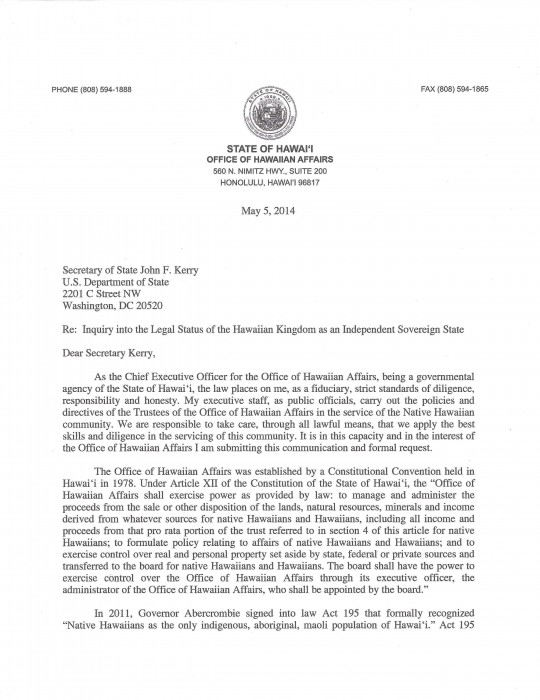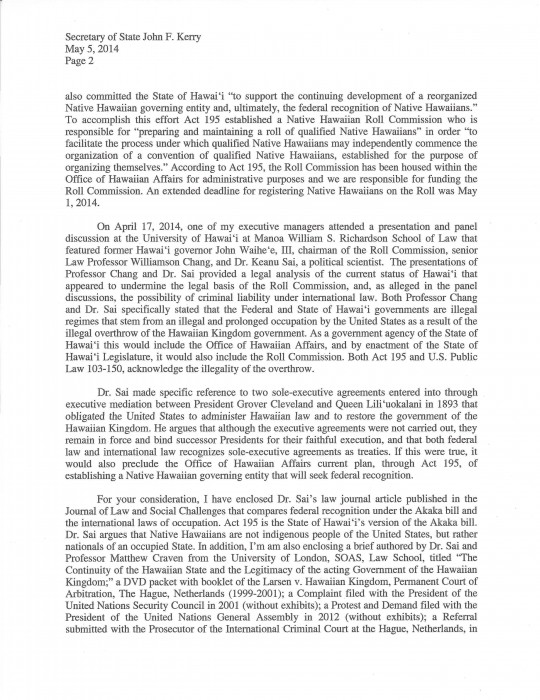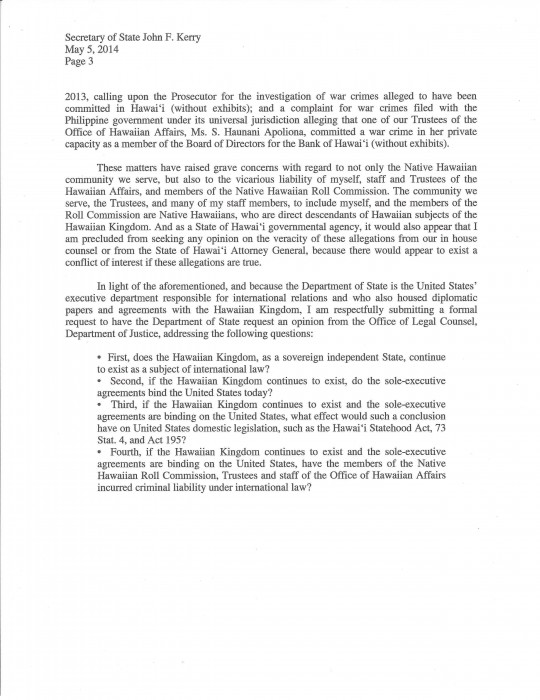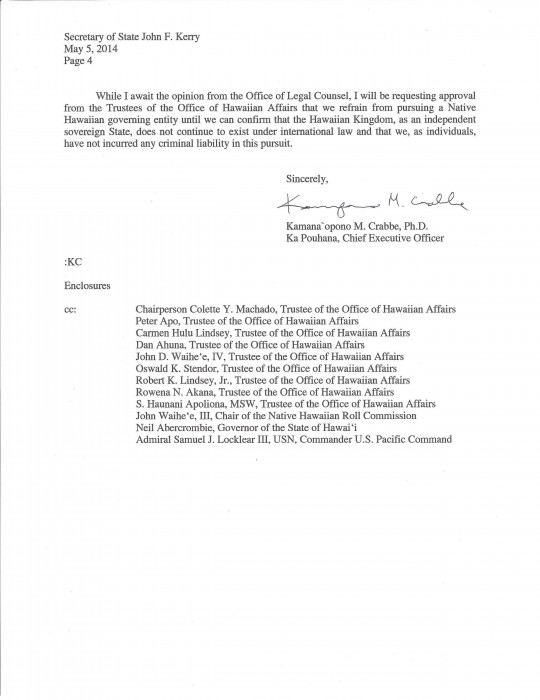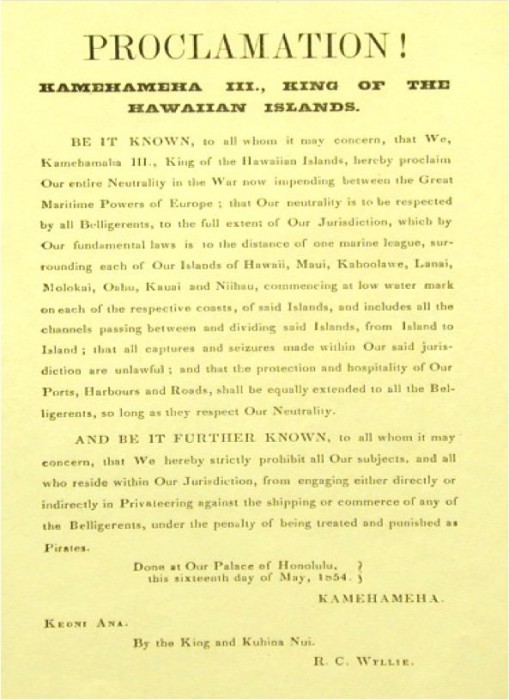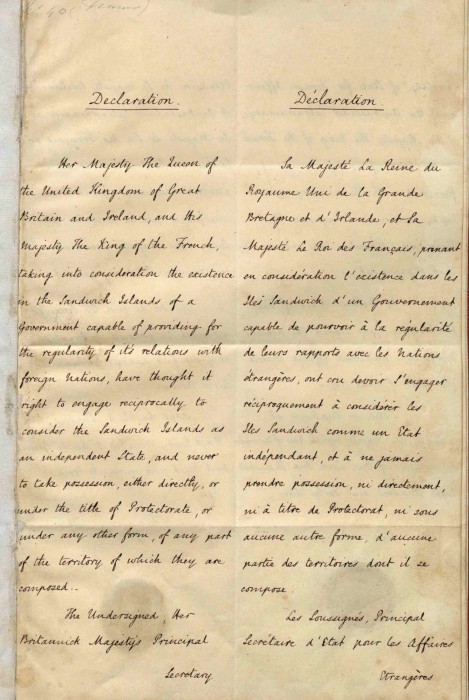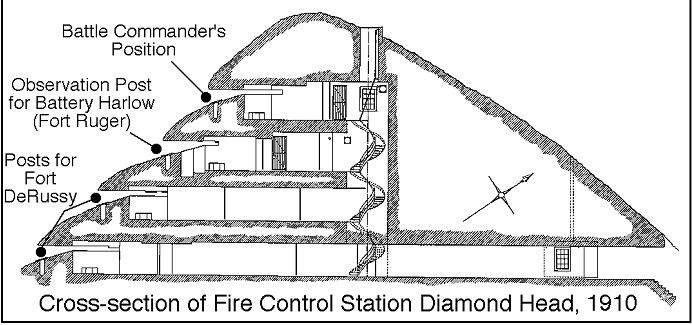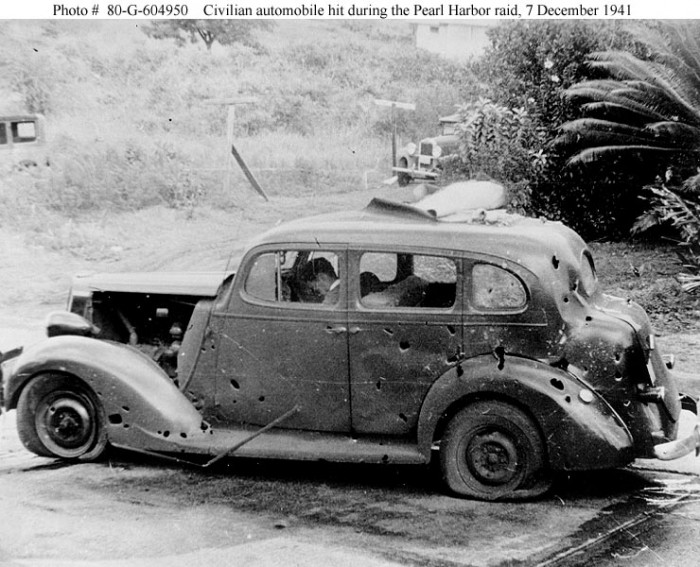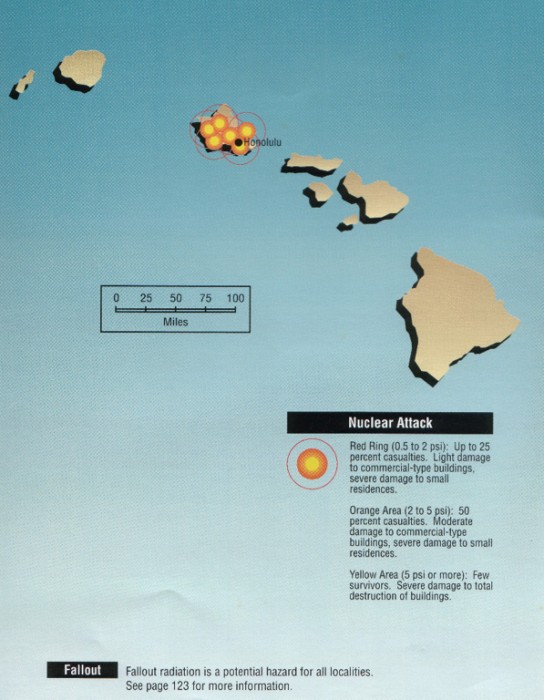Here follows the letter Office of Hawaiian Affairs CEO Kamana‘opono Crabbe submitted to the Department of State dated May 5, 2014. What will be gleaned from the letter itself is that the CEO was well within his vested power to seek clarity on the question of the continued existence of the Hawaiian Kingdom.
Category Archives: Treaties
What Have the Office of Hawaiian Affairs Trustees Done—It Doesn’t Make Sense or Does It?
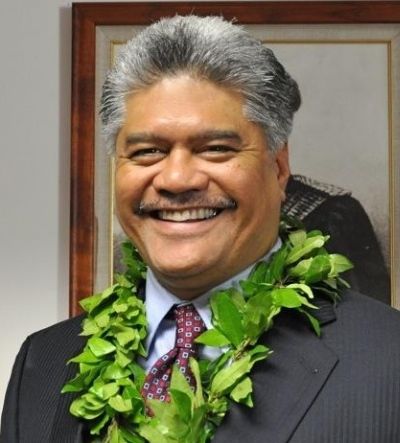 After the Office of Hawaiian Affairs CEO Dr. Kamana‘opono Crabbe submitted a formal request to Secretary of State John Kerry seeking clarification on the legal status of Hawai‘i under international law, all nine OHA Trustees yesterday signed a letter to the Secretary of State, stating:
After the Office of Hawaiian Affairs CEO Dr. Kamana‘opono Crabbe submitted a formal request to Secretary of State John Kerry seeking clarification on the legal status of Hawai‘i under international law, all nine OHA Trustees yesterday signed a letter to the Secretary of State, stating:
“We understand that you received a letter from Office of Hawaiian Affairs Chief Executive Officer Kamana‘opono M. Crabbe, PhD dated May 5, 2014. The contents of that letter do not reflect the position of the Board of Trustees of the Office of Hawaiian Affairs or the position of the Office of Hawaiian Affairs. That letter is hereby rescinded.”
Did the Trustees even read Dr. Crabbe’s letter? How do you rescind a letter that seeks clarification for risk management purposes. You can’t. The only person that can rescind the letter is the CEO himself, and only when the risks identified have been found to not be risks in the first place. Another word for this is fiduciary duty.
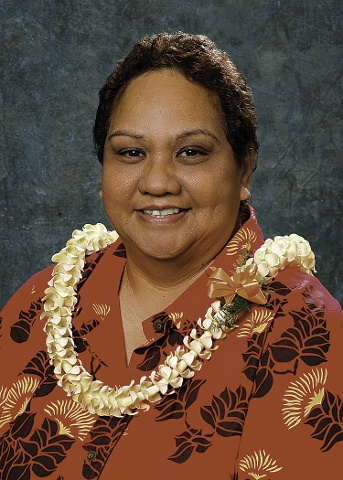 This morning’s front page article in the Star-Advertiser reported that Trustee Chairwoman Colette Machado said “Crabbe exceeded his authority as chief executive officer that requires him to consult the board on such matters.” Is Dr. Crabbe’s request for clarification a management issue or a board issue. Does the CEO need Board approval to ask questions? What is the position of the Board of Trustees of the Office of Hawaiian Affairs? We don’t want clarification? The so-called rescind letter is not only odd, but it is disingenuous and has nothing to do with Dr. Crabbe’s letter. It also raises the question of who is pulling the strings.
This morning’s front page article in the Star-Advertiser reported that Trustee Chairwoman Colette Machado said “Crabbe exceeded his authority as chief executive officer that requires him to consult the board on such matters.” Is Dr. Crabbe’s request for clarification a management issue or a board issue. Does the CEO need Board approval to ask questions? What is the position of the Board of Trustees of the Office of Hawaiian Affairs? We don’t want clarification? The so-called rescind letter is not only odd, but it is disingenuous and has nothing to do with Dr. Crabbe’s letter. It also raises the question of who is pulling the strings.
After carefully reviewing Dr. Crabbe’s letter, he did not state or even imply that he was taking any position on whether or not the Hawaiian Kingdom continues to exist. He merely sought clarification on a legal issue that the Department of Justice’s Office of Legal Counsel is more than capable of answering. If there is any position taken by Dr. Crabbe its responsible management and the well-recognized principle “risk management.” His letter begins with:
“As the chief executive officer and administrator for the Office of Hawaiian Affairs, being a governmental agency of the State of Hawai‘i, the law places on me, as a fiduciary, strict standards of diligence, responsibility and honesty. My executive staff, as public officials, carry out the policies and directives of the Trustees of the Office of Hawaiian Affairs in the service of the Native Hawaiian community. We are responsible to take care, through all lawful means, that we apply the best skills and diligence in the servicing of this community. It is in this capacity and in the interest of the Office of Hawaiian Affairs I am submitting this communication and formal request.”
The performance of risk assessment begins with identification of risks. Once the risk or risks have been determined the management can choose to avoid the risk, reduce the risk, share the risk or retain the risk. After the option is made, management then calls for a plan for contingencies, create safeguards, and, lastly, to monitor.
Dr. Crabbe has clearly taken the path to avoid the risk by seeking clarification from the State Department and the Department of Justice’s Office of Legal Counsel.
From his letter he specifically states the risks began to surface when one of his executive managers attended a presentation and panel discussion at the University of Hawai‘i Law School featuring former Hawai‘i governor John Waihe‘e, III, senior Law Professor Williamson Chang and political scientist Dr. Keanu Sai. The law student chapter of the American Constitutional Society sponsored the presentation. Dr. Crabbe provided Secretary of State Kerry an online link to view the video of the law school presentation.
https://vimeo.com/92655472
Crabbe wrote, “The presentations of Professor Chang and Dr. Sai provided a legal analysis of the current status of Hawai‘i that appeared to undermine the legal basis of the Roll Commission, and, as alleged in the panel discussions, the possibility of criminal liability under international law. Both Professor Chang and Dr. Sai specifically stated that the Federal and State of Hawai‘i governments are illegal regimes that stem from an illegal and prolonged occupation by the United States as a result of the illegal overthrow of the Hawaiian Kingdom government. As a government agency of the State of Hawai‘i this would include the Office of Hawaiian Affairs, and by enactment of the State of Hawai‘i Legislature, it would also include the Roll Commission. Both Act 195 and U.S. Public Law 103-150, acknowledges the illegality of the overthrow.”
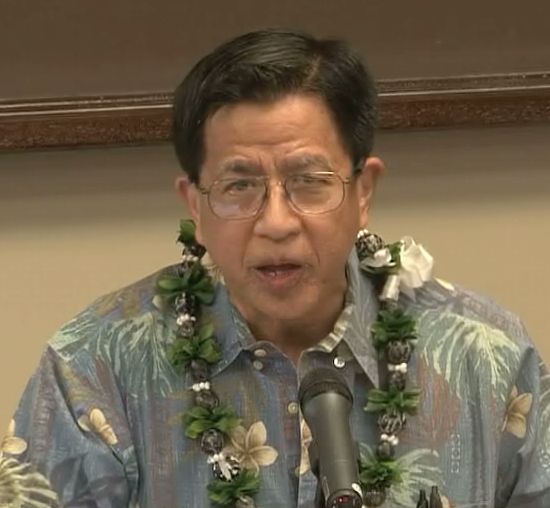 Here are some quotes from senior Law Professor Chang:
Here are some quotes from senior Law Professor Chang:
“The power of the United States, over the Hawaiian islands, and the jurisdiction of the United States in the State of Hawai’i, by its own admissions, by its own laws, doesn’t exist. And so that means that ever since the 1898 annexation of Hawai’i, by a Joint Resolution, they say, we have been living a myth.” (3:01 min/sec.)
“If you don’t have legal power over a territory, you’re governing without jurisdiction.” (4:20 min/sec.)
“…there’s no treaty between the United States and Hawai‘i by which Hawai‘i was acquired by the United States…” (4:41 min/sec.)
“A joint resolution, as an act of Congress, cannot acquire another country …If the United States could acquire Hawai‘i then the House of Nobles and the Legislative Assembly of Hawai‘i could acquire the United States.” (4:54 min/sec.)
“If two sovereigns are equal … one cannot acquire the other by its own laws.” (5:17 min/sec.)
“If Congress cannot, by Joint Resolution in 1898, acquire Hawai‘i unilaterally, it cannot do so in 1959.” (9:42 min/sec.)
“So in short, the United States by its own hands admits that it didn’t acquire the Hawaiian Islands, and all those Hawaiians, who have been saying the United States doesn’t have jurisdiction, have been right.” (11:25 min/sec.)
“So the annexation, that we all admit that nothing can be achieved without the United States going along with it, that’s the 900 lbs. elephant in the room. But we have to come in with the best leverage we have, and the best leverage we have is a hundred years of being lied to, being misrepresented, being told that we were part of the United States, and that has been legally false.” (17:19 min/sec.)
“…we’re all in this boat together in this journey of knowledge, and when I talk about the state of emergency, being the United States, how it is able to govern us for a hundred years without putting guns to our heads, it’s us. We’re the problem, the law school is the problem. Why, because judges and lawyers have a duty of candor and truth. Judges, on their own, have to tell the courts, tell the attorneys that there is no jurisdiction. It’s a duty of zealous representation for attorneys to present the best defense, and isn’t it the best defense that there’s no jurisdiction.” (1:36:41 hr/min/sec.)
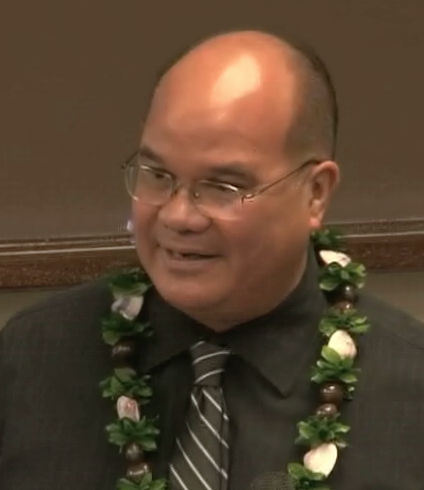 Here some quotes from political scientist Dr. Keanu Sai:
Here some quotes from political scientist Dr. Keanu Sai:
“Without a treaty, the United States has enacted “internal laws,” by its Congress, imposed in Hawai‘i…1898 Joint Resolution of Annexation, 1900 Territorial Act, 1959 Statehood Act, 1993 Joint Resolution of Apology for the 1893 Overthrow” (1:37:17 hr/min/sec.)
“Now the first and foremost restriction imposed by international law upon a State is that it may not exercise its power in any form in the territory of another State. In this sense jurisdiction is certainly territorial; it cannot be exercised by a State outside of its territory except by virtue of a permissive rule derived from international custom or from a convention.” (1:36:53 hr/min/sec.)
“military occupation confers upon the invading force the means of exercising control for the period of occupation. It does not transfer the sovereignty to the occupant, but simply the authority or power to exercise some of the rights of sovereignty.” (1:13:19 hr/min/sec.)
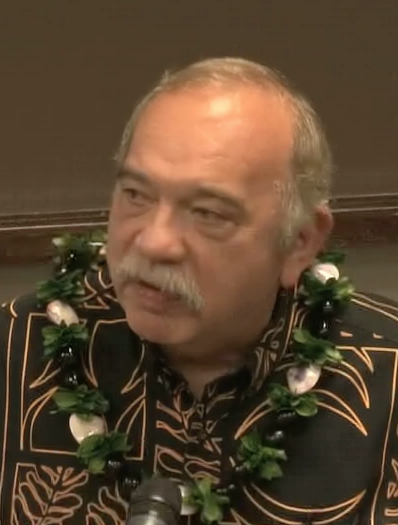 Even former governor and chairman of the Native Hawaiian Roll Commission Waihe‘e was in agreement with Dr. Sai’s analysis that Hawai‘i is not a part of the United States. Waihe‘e told the audience:
Even former governor and chairman of the Native Hawaiian Roll Commission Waihe‘e was in agreement with Dr. Sai’s analysis that Hawai‘i is not a part of the United States. Waihe‘e told the audience:
“I have absolutely no doubt that Hawai‘i is in an illegal occupation, I have absolutely no doubt. I mean, you’ve got to be illiterate not to finally get to that point.” (1:19:04 hr/min/sec.)
Can a CEO of the Office of Hawaiian Affairs take this lightly, especially when the Chairman of the Native Hawaiian Roll Commission himself stated he has no doubt that Hawai‘i is occupied and that you’ve got to be illiterate to not see it. Dr. Crabbe correctly states:
“These matters have raised grave concerns with regard to not only the Native Hawaiian community we serve, but also to the vicarious liability of myself, staff and Trustees of the Hawaiian Affairs, and members of the Native Hawaiian Roll Commission. The community we serve, the Trustees, and many of my staff members, to include myself, and the members of the Roll Commission are Native Hawaiians, who are direct descendants of Hawaiian subjects of the Hawaiian Kingdom. And as a State of Hawai‘i governmental agency, it would also appear that I am precluded from seeking any opinion on the veracity of these allegations from our in house counsel or from the State of Hawai‘i Attorney General, because there would appear to exist a conflict of interest if these allegations are true.”
Dr. Crabbe then provided the questions he’s seeking to be answered as part of the process of risk management.
• First, does the Hawaiian Kingdom, as a sovereign independent State, continue to exist as a subject of international law?
• Second, if the Hawaiian Kingdom continues to exist, do the sole-executive agreements bind the United States today?
• Third, if the Hawaiian Kingdom continues to exist and the sole-executive agreements are binding on the United States, what effect would such a conclusion have on United States domestic legislation, such as the Hawai‘i Statehood Act, 73 Stat. 4, and Act 195?
• Fourth, if the Hawaiian Kingdom continues to exist and the sole-executive agreements are binding on the United States, have the members of the Native Hawaiian Roll Commission, Trustees and staff of the Office of Hawaiian Affairs incurred criminal liability under international law?”
Dr. Crabbe’s conclusion in his letter clearly speaks to risk management and his determination to avoid the risk of criminal liability under international law. He stated, “While I await the opinion from the Office of Legal Counsel, I will be requesting approval from the Trustees of the Office of Hawaiian Affairs that we refrain from pursuing a Native Hawaiian governing entity until we can confirm that the Hawaiian Kingdom, as an independent sovereign State, does not continue to exist under international law and that we, as individuals, have not incurred any criminal liability in this pursuit.”
At no point has Dr. Crabbe taken a position for the Office of Hawaiian Affairs and nor has he taken a position of whether the Hawaiian Kingdom continues to exist. He’s seeking clarification from a federal agency who is more than capable of providing the answers. As chief executive officer, Dr. Crabbe is responsible for the protection of the staff at the Office of Hawaiian Affairs, which includes the Trustees, and to the Native Hawaiian community OHA serves. The Trustees’ so-called rescind letter is a blatant attempt to undermine the very duty Dr. Crabbe was appointed to do as the CEO of the Office of Hawaiian Affairs. The Trustees’ do not manage the Office of Hawaiian Affairs, the CEO does.
The irony is that Dr. Crabbe’s request for clarification is to protect the Trustees, even from themselves.
Hawai‘i News Now – Letter seeking clarity on Hawaiian Kingdom status is rescinded
HONOLULU (HawaiiNewsNow) – Does the Kingdom of Hawai’i exist today — and are we all subject to its rules? Those questions have triggered an internal dispute within the Office of Hawaiian Affairs.
OHA’s Chief Executive Officer created a firestorm Friday when word spread he sent a letter to the Secretary of State asking for an official opinion on whether the Hawaiian Kingdom still exists as an independent sovereign state under international law. Problem is, it appears no one else at OHA knew about or agreed with the letter, stirring an internal controversy that has raised concerns the inquiry could derail or delay Kana’iolowalu nation-building efforts.
Officials confirm the letter was quietly sent out on Monday by OHA CEO Dr. Kamana’opono Crabbe, in which he requested a formal legal opinion from the Justice Department.
“I will be requesting approval from the Trustees of the Office of Hawaiian Affairs that we refrain from pursuing a Native Hawaiian governing entity until we can confirm that the Hawaiian Kingdom as an independent sovereign State, does not continue to exist under international law and that we, as individuals, have no incurred any criminal liability in this pursuit,” Crabbe wrote.
OHA Chair Colette Machado tells Hawaii News Now she and fellow trustees only learned of the letter Friday afternoon.
“Our whole goal is to establish a Native Hawaiian governing entity and we are very close in achieving that. The Trustees fully support this, that’s why we’re quite surprised — how did our Chief Executive Officer not understand this by sending the letter to the state Department especially to the Secretary John Kerry? That’s why we had to respond quickly on a unanimous position to rescind that letter, because it is not an official position of OHA,” Machado said by phone from Washington, D.C., where she and Crabbe are attending a meeting about the upcoming World Conference on Indigenous Peoples at the invitation of the Department of State.
All nine trustees signed off on retracting the letter, which Machado confirms has already been sent to the Department of Justice.
“I want to assure the Hawaiian people that the Board of Trustees has not changed its position towards facilitating a process to reorganize a Native Hawaiian governing entity,” Machado said.
Native Hawaiian Roll Commission Chair, former Governor John Waihe’e, says he was also surprised by the letter.
“For all of us that know our history, there’s no doubt in our mind that the government of Queen Lili’uokalani was illegally overthrown and that the United States annexation of Hawaii was not done properly, was not done legally. In fact, this was admitted by the United States Congress when they passed the resolution — the apology resolution — in 1993. Any of us that know our history, know that we don’t need to ask anybody, know whether or not any of these things were proper — what we need to do is go about organizing ourselves and beginning to assert our own self governance. I don’t know what motivated Kamana’opono to do this, but personally I think it’s sort of disempowering. It’s a disempowering tactic to ask for permission to pursue your own destiny,” Waihe’e said.
More than 125,000 people have signed up for Kana’iolowalu to pursue a Native Hawaiian self-governing entity, an effort which OHA is financing.
“That’s more people than all the labor unions in Hawai’i combined,” said Waihe’e. “As far as we’re concerned, the Roll Commission is concerned, we’re still proceeding forward.”
Hawaii News Now was unable to reach Dr. Crabbe directly Friday. Officials confirm he scheduled a press conference for next week Monday to explain the inquiry, but now that the trustees have rescinded that letter it’s unclear if the press conference will still be happening.
To view Dr. Crabbe’s request letter, click here.
Washington Times: Agency seeks clarity on Hawaiian Kingdom status
HONOLULU (AP) – Office of Hawaiian Affairs CEO Kamanaopono Crabbe says he will seek approval from the agency’s trustees to refrain from pursuing a Native Hawaiian governing entity.
Crabbe says the agency would put nation building efforts on hold until officials are able to confirm the Hawaiian Kingdom doesn’t continue to exist under international law.
Crabbe outlined his proposal in a May 5 letter to Secretary of State John Kerry. The agency released a copy of the letter Friday.
The letter says an analysis from scholars alleging federal and state governments are illegal regimes has raised concerns. The analysis says OHA trustees and Native Hawaiian Roll Commission members may be criminally liable under international law.
Crabbe is asking the State Department to request an opinion from the Justice Department’s Office of Legal Counsel.
Associated Press: Office of Hawaiian Affairs seeks clarity on status of Hawaiian Kingdom under international law
HONOLULU — Office of Hawaiian Affairs CEO Kamanaopono Crabbe says he will seek approval from the agency’s trustees to refrain from pursuing a Native Hawaiian governing entity.
Crabbe says the agency would put nation building efforts on hold until officials are able to confirm the Hawaiian Kingdom doesn’t continue to exist under international law.
Crabbe outlined his proposal in a May 5 letter to Secretary of State John Kerry. The agency released a copy of the letter Friday.
The letter says an analysis from scholars alleging federal and state governments are illegal regimes has raised concerns. The analysis says OHA trustees and Native Hawaiian Roll Commission members may be criminally liable under international law.
Crabbe is asking the State Department to request an opinion from the Justice Department’s Office of Legal Counsel.
State of Hawai‘i Government Official Requests from U.S. State Department Legal Opinion on the Current Status of Hawai‘i under International Law
FOR IMMEDIATE RELEASE
MAY 09, 2014
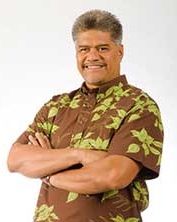 WASHINGTON, D.C. (May 9, 2014) – The Office of Hawaiian Affairs top executive submitted a formal request with the U.S. Department of State requesting a legal opinion from the U.S. Attorney General’s Office of Legal Counsel addressing the legal status of the Hawai‘i under international law.
WASHINGTON, D.C. (May 9, 2014) – The Office of Hawaiian Affairs top executive submitted a formal request with the U.S. Department of State requesting a legal opinion from the U.S. Attorney General’s Office of Legal Counsel addressing the legal status of the Hawai‘i under international law.
The Office of Legal Counsel drafts legal opinions of the U.S. Attorney General and also provides its own written opinions and oral advice in response to requests from the various agencies of the Executive Branch, which includes the Department of State.
Trustees and staff of the Office of Hawaiian Affairs are in Washington, D.C., at the invitation of the Department of State for a consultation with representatives of the federal government, federally recognized tribes and other indigenous peoples of the United States on May 9. The topic of the meeting is the World Conference on Indigenous Peoples, to be held at the United Nations, September 22-23, 2014. The meeting will take place at the U.S. Department of State, 23rd Street entrance, between C and D Streets, N.W., Washington, D.C.
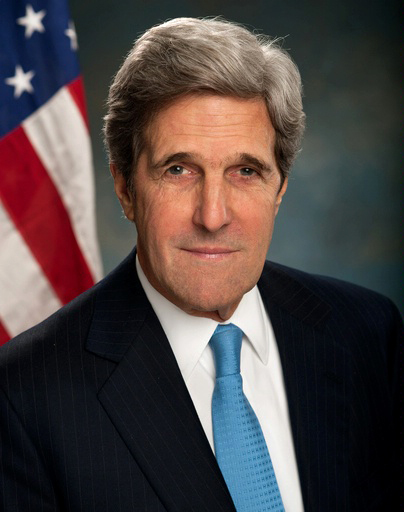 In a letter addressed to Secretary of State John F. Kerry, OHA Chief Executive Officer Dr. Kamana‘opono Crabbe, described his request as a very important question that needs to be answered from an agency that is not only qualified but authorized to answer, saying that it is addressing very grave concerns of OHA’s activities in its efforts toward nation building.
In a letter addressed to Secretary of State John F. Kerry, OHA Chief Executive Officer Dr. Kamana‘opono Crabbe, described his request as a very important question that needs to be answered from an agency that is not only qualified but authorized to answer, saying that it is addressing very grave concerns of OHA’s activities in its efforts toward nation building.
“As the chief executive officer and administrator for the Office of Hawaiian Affairs, being a governmental agency of the State of Hawai‘i, the law places on me, as a fiduciary, strict standards of diligence, responsibility and honesty,” Crabbe said. “My executive staff, as public officials, carry out the policies and directives of the Trustees of the Office of Hawaiian Affairs in the service of the Native Hawaiian community. We are responsible to take care, through all lawful means, that we apply the best skills and diligence in the servicing of this community.”
Crabbe explained the action taken was prompted when one of his staff attended a presentation and panel discussion at the William S. Richardson School of Law on April 17, 2014 that featured former Hawai‘i Governor John Waihe‘e, III, Chairman of the Native Hawaiian Roll Commission, senior Law Professor Williamson Chang, and Dr. Keanu Sai, a political scientist. Click here to view a video of the Law School presentation and panel discussion.
“The presentations of Professor Chang and Dr. Sai provided a legal analysis of the current status of Hawai‘i that appeared to undermine the legal basis of the Roll Commission, and, as alleged in the panel discussions, the possibility of criminal liability under international law. Both Professor Chang and Dr. Sai specifically stated that the Federal and State of Hawai‘i governments are illegal regimes that stem from an illegal and prolonged occupation by the United States as a result of the illegal overthrow of the Hawaiian Kingdom government.” Crabbe said. “As a government agency of the State of Hawai‘i this would include the Office of Hawaiian Affairs, and by enactment of the State of Hawai‘i Legislature, it would also include the Roll Commission. Both Act 195 and U.S. Public Law 103-150, acknowledges the illegality of the overthrow.”
According to Crabbe, “These matters have raised grave concerns with regard to not only the Native Hawaiian community we serve, but also to the vicarious liability of myself, staff and Trustees of the Office of Hawaiian Affairs, and members of the Native Hawaiian Roll Commission. The community we serve, the Trustees, and many of my staff members, to include myself, and the members of the Roll Commission are Native Hawaiians, who are direct descendants of Hawaiian subjects of the Hawaiian Kingdom.”
Crabbe said he wanted to seek an opinion on the veracity of these allegations from its in house counsel or from the State of Hawai‘i Attorney General, but felt he was prevented because there would appear to be a conflict of interest if these allegations were true.
In his letter, Crabbe said, “because the Department of State is the United States’ executive department responsible for international relations and who also housed diplomatic papers and agreements with the Hawaiian Kingdom, I am respectfully submitting a formal request to have the Department of State request an opinion from the Office of Legal Counsel, Department of Justice, addressing the following questions:
• First, does the Hawaiian Kingdom, as a sovereign independent State, continue to exist as a subject of international law?
• Second, if the Hawaiian Kingdom continues to exist, do the sole-executive agreements bind the United States today?
• Third, if the Hawaiian Kingdom continues to exist and the sole-executive agreements are binding on the United States, what effect would such a conclusion have on United States domestic legislation, such as the Hawai‘i Statehood Act, 73 Stat. 4, and Act 195?
• Fourth, if the Hawaiian Kingdom continues to exist and the sole-executive agreements are binding on the United States, have the members of the Native Hawaiian Roll Commission, Trustees and staff of the Office of Hawaiian Affairs incurred criminal liability under international law?”
A press conference is scheduled for Monday, May 12, at 10:00 a.m. when OHA’s Chief Executive Officer Dr. Crabbe returns from Washington, D.C.
Click here to download the request letter.
IMPORTANT NOTE: Dr. Crabbe’s letter specifically states:
“For your consideration, I have enclosed Dr. Sai’s law journal article published in the Journal of Law and Social Challenges that compares federal recognition under the Akaka bill and the international laws of occupation. Act 195 is the State of Hawai‘i’s version of the Akaka bill. Dr. Sai argues that Native Hawaiians are not indigenous people of the United States, but rather nationals of an occupied State. In addition, I’m am also enclosing a brief authored by Dr. Sai and Professor Matthew Craven from the University of London, SOAS, Law School, titled “The Continuity of the Hawaiian State and the Legitimacy of the acting Government of the Hawaiian Kingdom;” a DVD packet with booklet of the Larsen v. Hawaiian Kingdom, Permanent Court of Arbitration, The Hague, Netherlands (1999-2001); a Complaint filed with the President of the United Nations Security Council in 2001 (without exhibits); a Protest and Demand filed with the President of the United Nations General Assembly in 2012 (without exhibits); a Referral submitted with the Prosecutor of the International Criminal Court at the Hague, Netherlands, in 2013, calling upon the Prosecutor for the investigation of war crimes alleged to have been committed in Hawai‘i (without exhibits); and a complaint for war crimes filed with the Philippine government under its universal jurisdiction alleging that one of our Trustees of the Office of Hawaiian Affairs, Ms. S. Haunani Apoliona, committed a war crime in her private capacity as a member of the Board of Directors for the Bank of Hawai‘i (without exhibits).”
“While I await the opinion from the Office of Legal Counsel, I will be requesting approval from the Trustees of the Office of Hawaiian Affairs that we refrain from pursuing a Native Hawaiian governing entity until we can confirm that the Hawaiian Kingdom, as an independent sovereign State, does not continue to exist under international law and that we, as individuals, have not incurred any criminal liability in this pursuit.”
# # #
Media Contact: Garett Kamemoto
Communications Manager
808-594-1982
garettk@oha.org
Swiss Foreign Ministry Meets With Hawaiian Envoy in Bern
Due to the war crimes that continue to be committed with impunity by the State of Hawai‘i, an illegal regime, against innocent civilians, the acting government of the Hawaiian Kingdom has temporarily refrained from pursuing its proceedings at the International Court of Justice and has decided to focus its attention to secure a Protecting Power pursuant to the Fourth Geneva Convention (GCIV) and the Additional Protocol I (API). A Protecting Power is a State that ensures compliance of the Hawaiian Kingdom and the United States to the provisions of the GCIV and API, with particular focus on the protection of civilians.
As a State Party to the GCIV and AP, article 5(1) of the API, states, “It is the duty of the Parties to a conflict from the beginning of that conflict to secure the supervision and implementation of the Conventions and of this Protocol by the application of the system of Protecting Powers, including inter alia the designation and acceptance of those Powers, in accordance with the following paragraphs.” And according to article 5(3) of the API, if a Protecting Power has not been designated, “the International Committee of the Red Cross…shall offer its good offices to the Parties to the conflict with a view to the designation without delay of a Protecting Power to which the Parties to the conflict consent.”
On December 18, 2013, at its headquarters in Geneva, Switzerland, the International Committee of the Red Cross (ICRC) was formally requested to assist the Hawaiian Kingdom in securing a Protecting Power in accordance with the GCIV and API. In this pursuit, the acting government has been in the process of securing a meeting with the Swiss government in order to formally request that it be a Protecting Power and to work with the ICRC. The Swiss government has a long history of serving as a mediator to international conflicts and did serve as a protecting power in the past. A meeting was secured on March 26, 2014, and the Swiss Federal Department of Foreign Affairs’ Directorate of International Law in Bern, Switzerland, received the acting government’s Envoy Extraordinary and Minister Plenipotentiary. Negotiations to secure Switzerland as a Protecting Power for the illegal and prolonged occupation of the Hawaiian Kingdom have begun.
Hawai‘i and the Namibia Exception
According to international law, the United States Federal government and the United States’ State of Hawai‘i government operating within the territory of the Hawaiian Kingdom are illegal regimes. Article 43 of the Hague Convention, IV, mandates that the occupying State, the United States, to administer the laws of the occupied State, the Hawaiian Kingdom. According to Professor Marco Sassoli, Article 43 of the Hague Regulations and Peace Operations in the Twenty-first Century, p. 5, “Article 43 does not confer on the occupying power any sovereignty over the occupied territory. The occupant may therefore not extend its own legislation over the occupied territory nor act as a sovereign legislator. It must, as a matter of principle, respect the laws in force in the occupied territory at the beginning of the occupation.”
These illegal regimes are and have been administering United States law and not Hawaiian law in an attempt to conceal the prolonged and illegal occupation of the Hawaiian Kingdom. According to Dr. Yaël Ronen, Status of Settlers Implanted by Illegal Regimes under International Law (2008), p. 2, “Illegal regimes often transfer of their own populations or populations loyal to them in the territory, and subsequently grant these populations residence or nationality in the territory. This is done in order to change the demographic composition of the territory under dispute and thereby solidify the regime.”
When another country’s government is operating within the territory of another country without title or sovereignty, every official action taken by that regime is illegal and void except for its registration of births, marriages and deaths. This is called the “Namibia exception,” which is a decision by the International Court of Justice (ICJ) in 1971 called the Legal Consequences for States of the Continued Presence of South Africa in Namibia (South West Africa) notwithstanding Security Council Resolution 276 (1970).
In 1966, the United Nations General Assembly passed resolution 2145 (XXI) that terminated South Africa’s administration of Namibia, formerly known as South West Africa, a former German colony. This resulted in Namibia coming under the administration of the United Nations, but South Africa refused to withdraw from Namibian territory and consequently the situation transformed into an illegal occupation. As a former German colony, Namibia became a mandate territory under the administration of South Africa after the close of the First World War.
Addressing the legal consequences arising for South Africa’s refusal to leave Namibia, the ICJ stated that by “occupying the Territory without title, South Africa incurs international responsibilities arising from a continuing violation of an international obligation,” and that all countries, whether a member of the United Nations or not were “under an obligation to recognize the illegality and invalidity of South Africa’s continued presence in Namibia and to refrain from lending any support or any form of assistance to South Africa with reference to its occupation of Namibia.” The ICJ, however, clarified that “non-recognition should not result in depriving the people of Namibia of any advantages derived from international cooperation.
The conduct of an illegal regime during occupation is limited and confined to the international laws of occupation and to the principle of ex injuria ius non oritur—where unlawful acts cannot be the source of lawful rights. According to Ronen, p. 39, “Opposite the principle of ex injuria jus non oritur operates the principle ex factis ius oritur. It mandates that acts of the illegal regime may have legal consequences despite the illegality and status of the regime that performed them.” Ronen explains, “In other words, the general invalidity of domestic acts carried out under an illegal regime is qualified where such invalidity would act to the detriment of the inhabitants of the territory. This is the Namibia exception.” The ICJ in the Namibia case explained, “the principle ex injuria jus non oritur dictates that acts which are contrary to international law cannot become a source of legal acts for the wrongdoer… To grant recognition to illegal acts or situation will tend to perpetuate it and be benefitial to the state which has acted illegally.”
The focus of the Namibia exception is to protect the interests of the nationals of the occupied State and not to entrench the authority of an illegal regime. The validity of any other official acts of an illegal regime other than the registration of births, marriages and deaths must not serve “to the detriment of the inhabitants of the territory” being occupied and must not be seen to further “entrench the authority of an illegal regime.”
Hawai‘i and the Crimean Conflict
 Today on CNN’s coverage of the “Crisis in Ukraine” at 3:31pm (Eastern Time), news anchor Brooke Baldwin made a very interesting comment. Baldwin stated, “Ukrainian officials believe 30,000 Russian troops are now there in that small peninsula about the size of Hawai‘i.” This is a very interesting comparison by CNN to make reference to Hawai‘i with the Crimean conflict, especially when it would appear that CNN has no knowledge, or do they, of Hawai‘i’s direct link to Crimea regarding Hawaiian neutrality and the correlation between the argument of Russian intervention and United States intervention in the Hawaiian Kingdom. CNN also reported that Russia warns U.S. that threatened sanctions will “boomerang.”
Today on CNN’s coverage of the “Crisis in Ukraine” at 3:31pm (Eastern Time), news anchor Brooke Baldwin made a very interesting comment. Baldwin stated, “Ukrainian officials believe 30,000 Russian troops are now there in that small peninsula about the size of Hawai‘i.” This is a very interesting comparison by CNN to make reference to Hawai‘i with the Crimean conflict, especially when it would appear that CNN has no knowledge, or do they, of Hawai‘i’s direct link to Crimea regarding Hawaiian neutrality and the correlation between the argument of Russian intervention and United States intervention in the Hawaiian Kingdom. CNN also reported that Russia warns U.S. that threatened sanctions will “boomerang.”
What is at the center of the Ukrainian crisis is “intervention,” and whether or not international law has been violated. The United States says yes, but Russia says no. The international law on intervention is clearly prohibitive, but there are exceptions according to Oppenheim, International Law, vol. 1, (7th ed. 1948), p. 274. The two exceptions that appear to be in line with the Crimean conflict are, first, where restrictions on a treaty are not being complied with, and, second, the rights of citizens of the intervening State are being threatened.
Restrictive Treaty
The treaty that the United States consistently makes reference to as to why Russian actions in the Crimea is a violation of international law is the 1997 Friendship Treaty between Ukraine and Russia. At the ceremonies in Kiev, Russian President Boris Yeltsin, declared, “We respect and honor the territorial integrity of Ukraine.” A State’s territorial integrity, however, is protected by international law and not just by a treaty. International law provides that “the territorial integrity and political independence of the State are inviolable.” This treaty does not appear to be President Vladimir Putin’s justification for Russian action in the Crimea. Instead, Putin appears to refer to the treaty that centers on the Russian Naval Base at Sevastopol.
In the aftermath of the breakup of the Soviet Union, Russia negotiated the fate of its military bases that were located outside of Russian territory. Russia’s Naval Base at Sevastopol in Crimea dates back to 1783 when the Russian Prince Grigory Potemkin founded the port city. In 1997, Russia and Ukraine signed a Partition Treaty whereby Russia would maintain its naval base after purchasing 81.7% of Ukraine’s naval ships for $526.5 million dollars as reported by RT News. This treaty was ratified in 1999 by both governments. The treaty allows the Russian Black Sea Fleet to remain in Crimea until 2042. Russia claims that the new government in Kiev is not legitimate and its anti-Russian rhetoric a threat to its Naval Base at Sevastopol and the maintenance of the 1997 Partition Treaty. According to international law, this would be a justification for intervention and it would appear that Putin is correct in that Russia is complying with international law.
At this stage, Russia has not deployed its troops into Ukraine even though the Russian Parliament authorized Putin the authority to do so. What has taken place in Crimea is not an invasion, but rather actions taken by Russian troops that were already stationed in Crimea at its Naval Base in Sevastopol. The 1997 Partition Treaty allows for 25,000 Russian troops, 24 artillery systems with a caliber smaller than 100 mm, 132 armored vehicles, and 22 military planes on Crimean territory. It appears that Russia has used its military force in Crimea to ensure that its Naval Base will not be seized. Although, these troops did not have any Russian insignia in order to identify a chain of command, they are Russian citizens who wore military garb. Putin has stated that, “Russian forces in Crimea are only acting to protect Russian military assets. It is ‘citizens’ defense groups,’ not Russian forces, who have seized infrastructure and military facilities in Crimea.” If Putin ordered the Russian Forces in Crimea to seize Ukrainian infrastructure and military facilities, it would be intervention, but by stating they are citizens defense groups, it is a clever way to sidestep intervention. But intervention would be justified if Russia feels that its 1997 Partition Treaty is being threatened, which would allow Russia to preemptively neutralize Ukrainian military posts in Crimea before they can attack the naval base.
Protection of Citizens
As reported by Aljazeera, “Unhappy with the outcome of the protests in the capital and alarmed at the rise of Ukrainian nationalist groups in Kiev, many ethnic Russians in Crimea, who make up almost 60 percent of the population here, have been protesting and calling for Russia to come to their aid—with some even going as far as demanding their neighbor immediately absorb the territory.” International law does not allow for citizens to have the authority to call for intervention, but the intervening State may feel it has a duty to intervene and will unilaterally do so. It is, however, a point of contention as to the extent of the threat to ethnic Russians, or if there is any threat at all to warrant Russian intervention.
What is lacking in the Crimean conflict is an impartial investigation into the crisis where legally relevant facts could be gathered and conclusions made in accordance with international law. For the Hawaiian crisis in 1893, President Benjamin Harrison refused to do an investigation that was called for by Queen Lili‘uokalani, because he was intent on annexing the Hawaiian Kingdom for military purposes. It was his successor in office, Grover Cleveland, that did the investigation in accordance with international law. In his message to Congress, Cleveland stated,
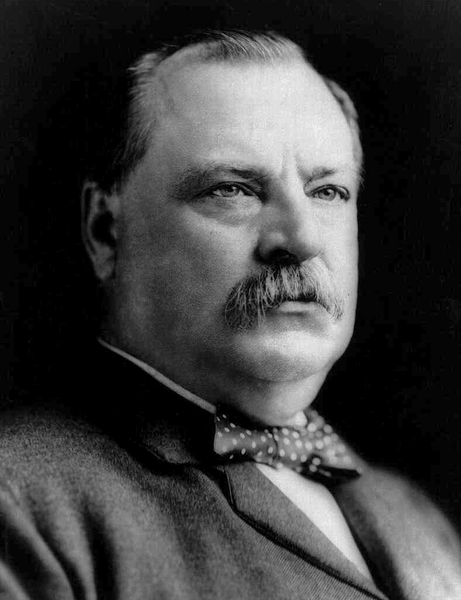 “The law of nations is founded upon reason and justice, and the rules of conduct governing individual relations between citizens or subjects of a civilized state are equally applicable as between enlightened nations. The considerations that international law is without a court for its enforcement, and that obedience to its commands practically depends upon good faith, instead of upon the mandate of a superior tribunal, only give additional sanction to the law itself and brand any deliberate infraction of it not merely as a wrong but as a disgrace. A man of true honor protects the unwritten word which binds his conscience more scrupulously, if possible, than he does the bond a breach of which subjects him to legal liabilities; and the United States in aiming to maintain itself as one of the most enlightened of nations would do its citizens gross injustice if it applied to its international relations any other than a high standard of honor and morality. On that ground the United States can not properly be put in the position of countenancing a wrong after its commission any more than in that of consenting to it in advance. On that ground it can not allow itself to refuse to redress an injury inflicted through an abuse of power by officers clothed with its authority and wearing its uniform; and on the same ground, if a feeble but friendly state is in danger of being robbed of its independence and its sovereignty by a misuse of the name and power of the United States, the United States can not fail to vindicate its honor and its sense of justice by an earnest effort to make all possible reparation.”
“The law of nations is founded upon reason and justice, and the rules of conduct governing individual relations between citizens or subjects of a civilized state are equally applicable as between enlightened nations. The considerations that international law is without a court for its enforcement, and that obedience to its commands practically depends upon good faith, instead of upon the mandate of a superior tribunal, only give additional sanction to the law itself and brand any deliberate infraction of it not merely as a wrong but as a disgrace. A man of true honor protects the unwritten word which binds his conscience more scrupulously, if possible, than he does the bond a breach of which subjects him to legal liabilities; and the United States in aiming to maintain itself as one of the most enlightened of nations would do its citizens gross injustice if it applied to its international relations any other than a high standard of honor and morality. On that ground the United States can not properly be put in the position of countenancing a wrong after its commission any more than in that of consenting to it in advance. On that ground it can not allow itself to refuse to redress an injury inflicted through an abuse of power by officers clothed with its authority and wearing its uniform; and on the same ground, if a feeble but friendly state is in danger of being robbed of its independence and its sovereignty by a misuse of the name and power of the United States, the United States can not fail to vindicate its honor and its sense of justice by an earnest effort to make all possible reparation.”
“These principles apply to the present case with irresistible force when the special conditions of the Queen’s surrender of her sovereignty are recalled. She surrendered not to the provisional government, but to the United States. She surrendered not absolutely and permanently, but temporarily and conditionally until such time as the facts could be considered by the United States. Furthermore, the provisional government acquiesced in her surrender in that manner and on those terms, not only by tacit consent, but through the positive acts of some members of that government who urged her peaceable submission, not merely to avoid bloodshed, but because she could place implicit reliance upon the justice of the United States, and that the whole subject would be finally considered at Washington.”
According to international law there is a recognized legal maxim, ex injuria jus non oritur, whereby a State cannot claim valid legal results from an illegal act committed against another State. The International Court of Justice, in its Advisory Opinion on Namibia (June 21, 1971), explained, “the principle ex injuria jus non oritur dictates that acts which are contrary to international law cannot become a source of legal acts for the wrongdoer… To grant recognition to illegal acts or situation will tend to perpetuate it and be benefitial to the state which has acted illegally.”
United States Intervention in Hawai‘i and the Russian Intervention in Crimea
 On March 4, 2014, CNN covered a speech by U.S. Secretary of State John Kerry in Kiev, Ukraine. Kerry stated, “They would have you believe that ethnic Russians and Russian bases are threatened. They would have you believe the Kiev was trying to destabilize Crimea or that Russian actions were legal or legitimate because Crimean leaders invited intervention. And as everybody knows the soldiers in Crimea, at the instruction of their government, had stood their ground, had never fired a shot, never issued one provocation.”
On March 4, 2014, CNN covered a speech by U.S. Secretary of State John Kerry in Kiev, Ukraine. Kerry stated, “They would have you believe that ethnic Russians and Russian bases are threatened. They would have you believe the Kiev was trying to destabilize Crimea or that Russian actions were legal or legitimate because Crimean leaders invited intervention. And as everybody knows the soldiers in Crimea, at the instruction of their government, had stood their ground, had never fired a shot, never issued one provocation.”
Kerry accused Russia of doing exactly what the United States did to the Hawaiian  Kingdom in January 1893. Unlike the Crimean dispute, however, the Hawaiian dispute was settled by U.S. President Grover Cleveland after he initiated an investigation into the overthrow of the Hawaiian government
Kingdom in January 1893. Unlike the Crimean dispute, however, the Hawaiian dispute was settled by U.S. President Grover Cleveland after he initiated an investigation into the overthrow of the Hawaiian government at the request of Queen Lili‘uokalani, Hawaiian Head of State, in March 1893. At the center of the investigation were the actions taken by U.S. Minister Plenipotentiary John Stevens
at the request of Queen Lili‘uokalani, Hawaiian Head of State, in March 1893. At the center of the investigation were the actions taken by U.S. Minister Plenipotentiary John Stevens 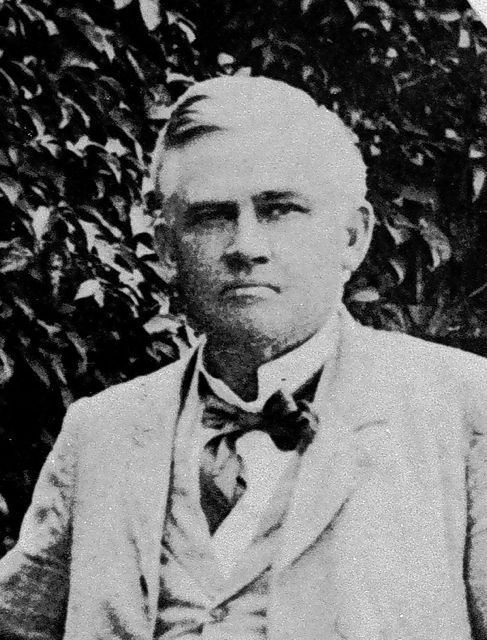 and the commander of U.S. troops aboard the U.S.S. Boston anchored in Honolulu Harbor, Captain Gilbert Wiltse. The intervention occurred during President Benjamin Harrison’s administration. The President appointed James Blount as Special Commissioner who submitted reports between April and July 1893 to U.S. Secretary of State Walter Gresham. The investigation was concluded by Gresham on October 18, 1893. President Cleveland notified the Congress of the conclusion of the investigation by presidential message on December 18, 1893, while negotiations were still taking place with the Queen in Honolulu.
and the commander of U.S. troops aboard the U.S.S. Boston anchored in Honolulu Harbor, Captain Gilbert Wiltse. The intervention occurred during President Benjamin Harrison’s administration. The President appointed James Blount as Special Commissioner who submitted reports between April and July 1893 to U.S. Secretary of State Walter Gresham. The investigation was concluded by Gresham on October 18, 1893. President Cleveland notified the Congress of the conclusion of the investigation by presidential message on December 18, 1893, while negotiations were still taking place with the Queen in Honolulu.
The investigation determined that the United States unlawfully intervened in the internal affairs of the Hawaiian Kingdom, and that its diplomat and troops were directly responsible for the illegal overthrow of the Hawaiian government. Gresham recommended to President Cleveland that the Hawaiian government must be restored and compensation must be provided. This prompted executive mediation between President Cleveland and Queen Lili‘uokalani to settle the dispute and by exchange of notes an executive agreement, called the “Agreement of Restoration,” was concluded whereby the President committed to the restoration of the Hawaiian government and the Queen, thereafter, to grant amnesty to the insurgents. The President did not carry out the international agreement because of political wrangling in the Congress, and President Cleveland’s successor, William McKinley, unilaterally seized the Hawaiian Islands during the Spanish-American War on August 12, 1898. Hawai‘i has been under an illegal and prolonged occupation ever since.
 Here follows Gresham’s report to President Cleveland regarding U.S. intervention in Hawai‘i that took place under President Benjamin Harrison’s administration.
Here follows Gresham’s report to President Cleveland regarding U.S. intervention in Hawai‘i that took place under President Benjamin Harrison’s administration.
Department of State,
Washington, October 18, 1893
The President:
The full and impartial reports submitted by the Hon. James H. Blount, your special commissioner to the Hawaiian Islands, established the following facts:
Queen Liliuokalani announced her intention on Saturday, January 14, 1893, to proclaim a new constitution, but the opposition of her ministers and other induced her to speedily change her purpose and make public announcement of that fact.
At a meeting in Honolulu, late on the afternoon of that day, a so-called committee of public safety, consisting of thirteen men, being all or nearly all who were present, was appointed “to consider the situation and devise ways and means for the maintenance of the public peace and the protection of life and property,” and at a meeting of this committee on the 15th, or the forenoon of the 16th of January, it was resolved amongst other things that a provisional government be created “to exist until terms of union with the United States of America have been negotiated and agreed upon.” At a mass meeting which assembled at 2 p.m. on the last named day, the Queen and her supporters were condemned and denounced, and the committee was continued and all its act approved.
Later the same afternoon the committee addressed a letter to John L. Stevens, the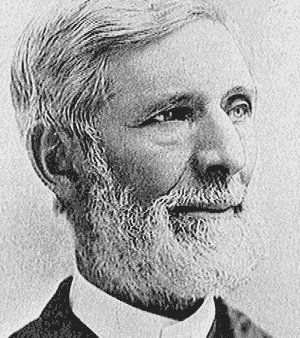 American minister at Honolulu, stating that the lives and property of the people were in peril and appealing to him and the United States forces at his command for assistance. This communication concluded “we are unable to protect ourselves without aid, and therefore hope for the protection of the United States forces.” On receipt of this letter Mr. Stevens requested
American minister at Honolulu, stating that the lives and property of the people were in peril and appealing to him and the United States forces at his command for assistance. This communication concluded “we are unable to protect ourselves without aid, and therefore hope for the protection of the United States forces.” On receipt of this letter Mr. Stevens requested 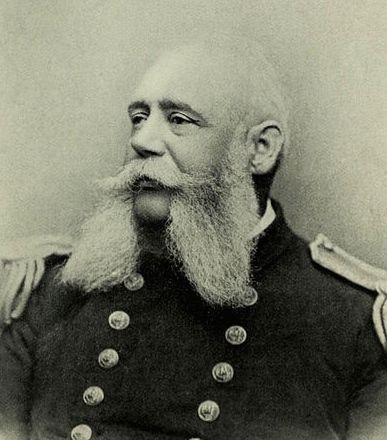 Capt. Wiltse, commander of the U.S.S. Boston, to land a force “for the protection of the United States legation, United States consulate, and to secure the safety of American life and property.” The well armed troops, accompanied by two gatling guns, were promptly landed and marched through the quiet streets of Honolulu to a public hall, previously secured by Mr. Stevens for their accommodation. This hall was just across the street form the government building, and in plain view of the Queen’s palace. The reason for thus locating the military will presently appear. The governor of the Island immediately addressed to Mr. Stevens a communication protesting against the act as an unwarranted invasion of Hawaiian soil and reminding him that the proper authorities had never denied permission to the naval forces of the United States to land for drill or any other proper purpose.
Capt. Wiltse, commander of the U.S.S. Boston, to land a force “for the protection of the United States legation, United States consulate, and to secure the safety of American life and property.” The well armed troops, accompanied by two gatling guns, were promptly landed and marched through the quiet streets of Honolulu to a public hall, previously secured by Mr. Stevens for their accommodation. This hall was just across the street form the government building, and in plain view of the Queen’s palace. The reason for thus locating the military will presently appear. The governor of the Island immediately addressed to Mr. Stevens a communication protesting against the act as an unwarranted invasion of Hawaiian soil and reminding him that the proper authorities had never denied permission to the naval forces of the United States to land for drill or any other proper purpose.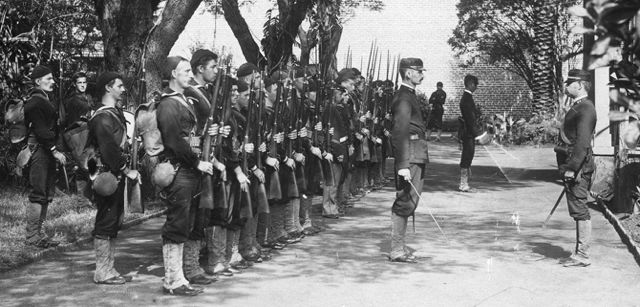
About the same time the Queen’s minister of foreign affairs sent a note to Mr. Stevens asking why the troops had been landed and informing him that the proper authorities were able and willing to afford full protection to the American legation and all American interests in Honolulu. Only evasive replies were sent to these communications.
While there were no manifestations of excitement or alarm in the city, and the people were ignorant of the contemplated movements, the committee entered the Government building, after first ascertaining that it was unguarded, and read a proclamation declaring that the existing Government was overthrown and a Provisional Government established in its place, “to exist until terms of union with the United States of America have been negotiated and agreed upon.” No audience was present when the proclamation was read, but during the reading 40 to 50 men, some of them indifferently armed, entered the room. The executive and advisory councils mentioned in the proclamation at once addressed a communication to Mr. Stevens, informing him that the monarchy had been abrogated and a provisional government established. This communication concluded:
Such Provisional Government has been proclaimed, is now in possession of the Government departmental buildings, the archives, and the treasury, and is in control of the city. We hereby request that you will, on behalf of the United States, recognize it as the existing de facto Government of the Hawaiian Islands and afford to it the moral support of your Government, and, if necessary, the support of American troops to assist in preserving the public peace.
 On receipt of this communication, Mr. Stevens immediately recognized the new Government, and, in a letter addressed to Sanford B. Dole, its President, informed him that he had done so. Mr. Dole replied:
On receipt of this communication, Mr. Stevens immediately recognized the new Government, and, in a letter addressed to Sanford B. Dole, its President, informed him that he had done so. Mr. Dole replied:
Government Building,
Honolulu, January 17, 1893
Sir: I acknowledge receipt of your valued communication of this day, recognizing the Hawaiian Provisional Government, and express deep appreciation of the same.
We have conferred with the ministers of the late Government, and have made demand upon the marshal to surrender the station house. We are not actually yet in possession of the station house, but as night is approaching and our forces may be insufficient to maintain order, we request the immediate support of the United States forces, and would request that the commander of the United States forces take command of our military forces, so that they may act together for the protection of the city.
Respectfully, yours,
Sanford B. Dole,
Chaiman Executive Council.
His Excellency John L. Stevens,
United States Minister Resident.
Note of Mr. Stevens at the end of the above communication.
“The above request not complied with.”
Stevens.
The station house was occupied by a well armed force, under the command of a resolute capable, officer. The same afternoon the Queen, her ministers, representatives of the Provisional Government, and other held a conference at the palace. Refusing to recognize the new authority or surrender to it, she was informed that the Provisional Government had the support of the American minister, and, if necessary, would be maintained by the military force of the United States then present; that any demonstration on her part would precipitate a conflict with that force; that she could not, with hope of success, engage in war with the United States, and that resistance would result in a useless sacrifice of life. Mr. Damon, one of the chief leader of the movement, and afterwards vice-president of the Provisional Government, informed the Queen that she could surrender under protest and her case would be considered later at Washington. Believing that, under the circumstances, submission was a duty, and that her case would be fairly considered by the President of the United States, the Queen finally yielded and sent to the Provisional Government the paper, which reads:
“I, Lili‘uokalani, by the grace of God and under the constitution of the Hawaiian Kingdom, Queen, do hereby solemnly protest against any and all acts done against myself and the constitutional Government of the Hawaiian Kingdom by certain persons claiming to have established a provisional government of and for this Kingdom.
That I yield to the superior force of the United States of America whose Minister Plenipotentiary, His Excellency John L. Stevens, has caused United States troops to be landed at Honolulu and declared that he would support the provisional government.
Now to avoid any collision of armed forces, and perhaps the loss of life, I do this under protest and impelled by said force yield my authority until such time as the Government of the United States shall, upon facts being presented to it, undo the action of its representatives and reinstate me in the authority which I claim as the Constitutional Sovereign of the Hawaiian Islands.”
When this paper was prepared at the conclusion of the conference, and signed by the Queen and her ministers, a number of persons, including one or more representatives of the Provisional Government, who were still present and understood its contents, by their silence, at least, acquiesced in its statements, and, when it was carried to President Dole, he indorsed upon it, “Received from the hands of the late cabinet this 17th day of January, 1893,” without challenging the truth of any of its assertions. Indeed, it was not claimed on the 17th day of January, or for some time thereafter, by any of the designated officers of the Provisional Government or any annexationist that the Queen surrendered otherwise than as stated in her protest.
In his dispatch to Mr. Foster of January 18, describing the so-called revolution, Mr. Stevens says:
The committee of public safety forthwith took possession of the Government building, archives, and treasury, and installed the Provisional Government at the head of the respective departments. This being an accomplished fact, I promptly recognized the Provisional Government as the de facto government of the Hawaiian Islands.
In Secretary Foster’s communication of February 15 to the President, laying before him the treaty of annexation, with the view to obtaining the advice and consent of the Senate thereto, he says:
At the time the Provisional Government took possession of the Government building no troops or officers of the United States were present or took any part whatever in the proceedings. No public recognition was accorded to the Provisional Government by the United States minister until after the Queen’s abdication, and when they were in effective possession of the Government building, the archives, the treasury, the barracks, the police station, and all the potential machinery of the Government.
Similar language is found in an official letter addressed to Secretary Foster on February 3 by the special commissioners sent to Washington by the Provisional Government to negotiate a treaty of annexation.
These statements are utterly at variance with the evidence, documentary and oral, contained in Mr. Blount’s reports. They are contradicted by declarations and letters of President Dole and other annexationists and by Mr. Stevens’s own verbal admissions to Mr. Blount. The Provisional Government was recognized when it had little other than a paper existence, and when the legitimate government was in full possession and control of the palace, the barracks, and the police station. Mr. Stevens’s well known hostility and the threatening presence of the force landed from the Boston was all that could then have excited serious apprehension in the minds of the Queen, her officers, and loyal supporters.
It is fair to say that Secretary Foster’s statements were based upon information which he had received from Mr. Stevens and the special commissioners, but I am unable to see that they were deceived. The troops were landed, not to protect American life and property, but to aid in overthrowing the existing government. Their very presence implied coercive measures against it.
In a statement given to Mr. Blount, by Admiral Skerret, the ranking naval officer at Honolulu, he says:
“If the troops were landed simply to protect American citizens and interests, they were badly stationed in Arion Hall, but if the intention was to aid the Provisional Government they were wisely stationed.”
This hall was so situated that the troops in it easily commanded the Government building, and the proclamation was real under the protection of American guns. At an early stage of the movement, if not at the beginning, Mr. Stevens promised the annexationists that as soon as they obtained possession of the Government building and there read a proclamation of the character above referred to, he would at once recognize them as a de facto government, and support them by landing a force from our war ship then in the harbor, and he kept that promise. This assurance was the inspiration on the movement, and without it the annexationists would not have exposed themselves to the consequences of failure. They relied upon no military force of their own, for they had none worthy of the name. The Provisional Government was established by the action of the American minister and the presence of the troops landed from the Boston, and its continued existence is due to the belief of the Hawaiians that if they made an effort to overthrow it, they would encounter the armed forces of the United States.
The earnest appeals to the American minister for military protection by the officers of that Government, after it had been recognized, show the utter absurdity of the claim that it was established by a successful revolution of the people of the Islands. Those appeals were a confession by the men who made them of their weakness and timidity. Courageous men, conscious of their strength and the justice of their cause, do not thus act. It is not now claimed that a majority of the people, having the right to vote under the constitution of 1887, ever favored the existing authority or annexation to this or any other country. They earnestly desire that the government of their choice shall be restored and its independence respected.
Mr. Blount states that while at Honolulu he did not meet a single annexationist who expressed willingness to submit the question to a vote of the people, nor did he talk with one on that subject who did not insist that if the Islands were annexed suffrage should be so restricted as to give complete control to foreigners or whites. Representative annexationists have repeatedly made similar statements to the undersigned.
The Government of Hawaii surrendered its authority under a threat of war, until such time only as the Government of the United States, upon the facts being presented to it, should reinstate the constitutional sovereign, and the Provisional Government was created “to exist until terms of union with the United States of America have been negotiated and agreed upon.” A careful consideration of the fact will, I think, convince you that the treaty which was withdrawn from the Senate for further consideration should not be resubmitted for its action thereon.
Should not the great wrong done to a feeble but independent State by an abuse of the authority of the United States be undone by restoring the legitimate government? Anything short of that will not, I respectfully submit, satisfy the demands of justice.
Can the United States consistently insist that other nations shall respect the independence of Hawaii while not respecting it themselves? Our Government was the first to recognize the independence of the Islands and it should be the last to acquire sovereignty over them by force and fraud.
Respectfully submitted.
W.Q. Gresham.
Hawaiian Neutrality and the Crimean Conflict
With the world’s attention on Russia and the Crimean Peninsula, people may not know that the Hawaiian Kingdom’s neutrality was prompted by hostilities that erupted between Russia and the European Powers during the Crimean War (1854-56). The Hawaiian Kingdom was also an active participant during the war in the development of the international laws on neutrality.
Russia’s Black Sea Naval Fleet is based at Sevastopol Naval Base in Crimea, which gives Russian naval vessels access to the Mediterranean and Aegean Seas, and further to the Atlantic Ocean. The two waterways that provide access from the Black Sea are Turkey’s Bosporus Straits and the Strait of the Dardanelles. Sevastopol Naval Base was also at the center of a war between Russia and the Ottoman Empire in 1853 over this access after Russia insisted that the Ottoman Turks recognize Russia’s right in the Middle East in order to protect Russian Orthodox in the Ottoman Empire. The Ottoman’s refused and war broke out. On March 28, 1854, France and Great Britain joined the war on the side of the Ottoman Turks in order to prevent Russia’s increase in power over the region.
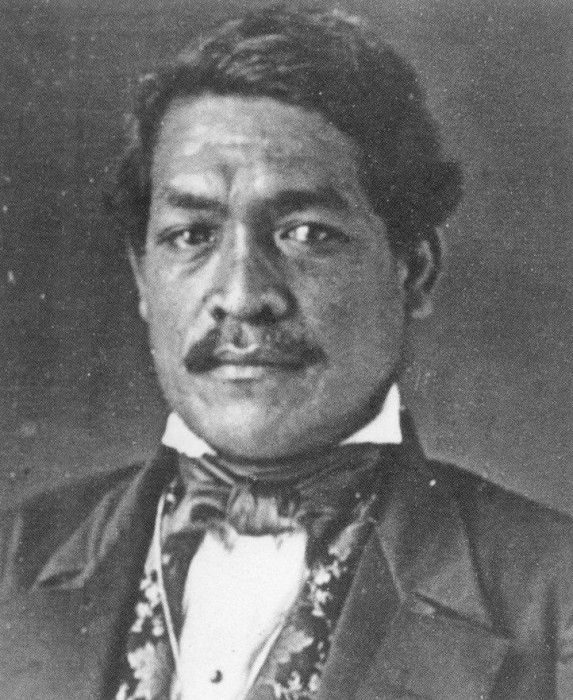 Naval battles between Russia and the French and British also spilled over to the Pacific Ocean where all three countries had naval and merchant ships. Battles were not confined to Crimea and the Caucasus, but were also fought in the Japan Seas, the Okhotsk Seas and in the North Pacific Ocean, and there was concern in Hawai‘i that it could reach the Hawaiian Islands. Just eleven years since Great Britain and France recognized the Hawaiian Kingdom as an independent State, King Kamehameha III, in Privy Council, declared the Hawaiian Kingdom to be a neutral State on May 16, 1854.
Naval battles between Russia and the French and British also spilled over to the Pacific Ocean where all three countries had naval and merchant ships. Battles were not confined to Crimea and the Caucasus, but were also fought in the Japan Seas, the Okhotsk Seas and in the North Pacific Ocean, and there was concern in Hawai‘i that it could reach the Hawaiian Islands. Just eleven years since Great Britain and France recognized the Hawaiian Kingdom as an independent State, King Kamehameha III, in Privy Council, declared the Hawaiian Kingdom to be a neutral State on May 16, 1854.
Prior to their impending involvement in the Crimean War, Great Britain and France each issued formal Declarations on March 28, 1854, and March 29, 1854, that declared neutral ships and goods would not be captured. Prior to this, international law did not afford protection for neutral ships carrying goods headed for the ports of countries who were at war. Under international law, these ships could be seized by either country’s naval vessels or by private ships that were commissioned by a country at war, which is called “privateering” and the goods seized were called “prizes.” The British and French diplomats that were posted in the Hawaiian Kingdom delivered both Declarations to the Hawaiian government.
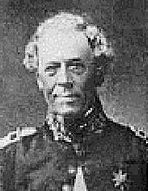 On June 15, 1854, the Hawaiian Committee on the National Rights in regards to prizes had delivered its report during a meeting of the Privy Council in Honolulu. Robert C. Wyllie, Hawaiian Minister of Foreign Affairs, presented the committee report and the following resolution was passed and later made known to the countries engaged in the Crimean War.
On June 15, 1854, the Hawaiian Committee on the National Rights in regards to prizes had delivered its report during a meeting of the Privy Council in Honolulu. Robert C. Wyllie, Hawaiian Minister of Foreign Affairs, presented the committee report and the following resolution was passed and later made known to the countries engaged in the Crimean War.
“Resolved: That in the Ports of this neutral Kingdom, the privilege of Asylum is extended equally and impartially to the armed national vessels and prizes made by such vessels of all the belligerents, but no authority can be delegated by any of the Belligerents to try and declare lawful and transfer the property of such prizes within the King’s Jurisdiction; nor can the King’s Tribunals exercise any such jurisdiction, except in cases where His Majesty’s Neutral Jurisdiction and Sovereignty may have been violated by the Captain of any vessel within the bounds of that Jurisdiction.”
To broaden the international law of neutrality, the United States sought to get countries to agree thereby creating customary international law. On December 6, 1854, the U.S. diplomat assigned to the Hawaiian Kingdom, David L. Gregg, sent the following dispatch to the Hawaiian government regarding the recognition of neutral rights. The correspondence stated,
“I have the honor to transmit to you a project of a declaration in relation to neutral rights which my Government has instructed me to submit to the consideration of the Government of Hawaii, and respectfully to request its approval and adoption. As you will perceive it affirms the principles that free ships make free goods, and that the property of neutrals, not contraband of war, found on board of Enemies ships, is not confiscable. These two principles have been adopted by Great Britain and France as rules of conduct towards all neutrals in the present European war; and it is pronounced that neither nation will refuse to recognize them as rules of international law, and to conform to them in all time to come. The Emperor of Russia has lately concluded a convention with the United States, embracing these principles as permanent, and immutable, and to be scrupulously observed towards all powers which accede to the same.”
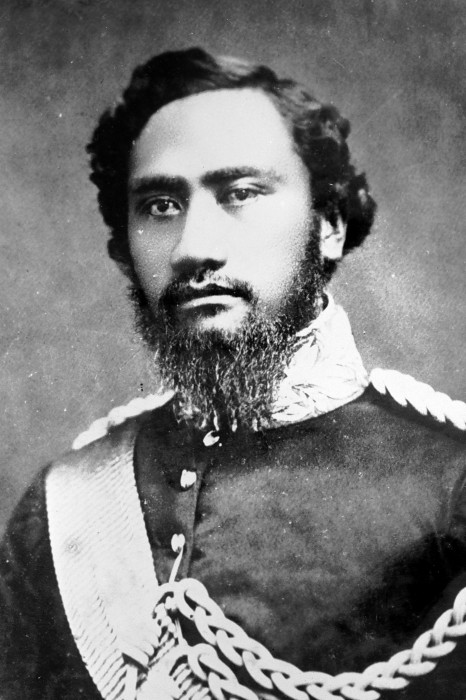 On January 12, 1855, the U.S. diplomat also sent another dispatch to the Hawaiian government that contained a copy of the July 22, 1854 Convention between the United States of America and Russia embracing certain principles in regard to neutral rights. After careful review of the U.S. President’s request, King Kamehameha IV in Privy Council, passed the following resolution on March 26, 1855.
On January 12, 1855, the U.S. diplomat also sent another dispatch to the Hawaiian government that contained a copy of the July 22, 1854 Convention between the United States of America and Russia embracing certain principles in regard to neutral rights. After careful review of the U.S. President’s request, King Kamehameha IV in Privy Council, passed the following resolution on March 26, 1855.
“Resolved: That the Declaration of accession to the principles of neutrality to which the President of the United States invites the King, is approved, and Mr. Wyllie is authorized to sign and seal the same and pass it officially to the Commissioner of the United States in reply to his dispatches of the 6th December and 12th January last.”
Following the Privy Council meeting on the same day, Robert C. Wyllie signed the Declaration of Accession to the Principles of Neutrality as requested by the United States President and delivered it to the U.S. diplomat David L. Gregg. The Declaration provided,
“And whereas His Majesty the King of the Hawaiian Islands, having considered the aforesaid invitation of the President of the United States, and the Rules established in the foregoing convention respecting the rights of neutrals during war, and having found such rules consistent with those proclaimed by Her Britannic Majesty in Her Declaration of the 28th March 1854, and by His Majesty the Emperor of the French in the Declaration of the 29th of the same month and year, as well as with Her Britannic Majesty’s order in Council of the 15th April same year, and with the peaceful and strictly neutral policy of this Kingdom as proclaimed by His late Majesty King Kamehameha III on the 11th May 1854, amplified and explained by Resolutions of His Privy Council of State of the 15th June and 17th July same year, His Majesty, by and with the advice of His Cabinet and Privy Council, has authorized the undersigned to declare in His name, as the undersigned now does declare that His Majesty accedes to the humane principles of the foregoing convention, in the sense of its III Article.”
On April 7, 1855, King Kamehameha IV opened the Legislative Assembly. In his speech he reiterated the Kingdom’s neutrality by stating:
“It is gratifying to me, on commencing my reign, to be able to inform you, that my relations with all the great Powers, between whom and myself exist treaties of amity, are of the most satisfactory nature. I have received from all of them, assurances that leave no room to doubt that my rights and sovereignty will be respected. My policy, as regards all foreign nations, being that of peace, impartiality and neutrality, in the spirit of the Proclamation by the late King, of the 16th May last, and of the Resolutions of the Privy Council of the 15th June and 17th July. I have given to the President of the United States, at his request, my solemn adhesion to the rule, and to the principles establishing the rights of neutrals during war, contained in the Convention between his Majesty the Emperor of all the Russias, and the United States, concluded in Washington on the 22nd July last.”
The actions taken by the governments of the Hawaiian Kingdom, Great Britain, France, Russia, and the United States of America relating to the development of the principles of international law on neutrality provided the necessary pretext for the leading European maritime powers to meet in Paris, after the Crimean War, and enter into a joint declaration that provided the following four principles: first, privateering is, and remains, abolished; second, the neutral flag covers enemy’s goods, with the exception of contraband of war; third, neutral goods, with the exception of contraband of war, are not liable to capture under the enemy’s flag; and, fourth, blockades, in order to be binding, must be effective, that is to say, maintained by a force sufficient really to prevent access to the coast of the enemy.
The Declarations and the 1854 Russo-American Convention represented the first recognition of the right of neutral States to conduct free trade without any hindrance from war. Stricter guidelines for neutrality were later established in the 1871 Anglo-American Treaty made during the wake of the American Civil War, whereby both States agreed to the following rules.
“First, to use due diligence to prevent the fitting out, arming, or equipping, within its jurisdiction, of any vessel which it has reasonable ground to believe is intended to cruise or to carry on war against a power with which it is at peace; and also to use like diligence to prevent the departure from its jurisdiction of any vessel intended to cruise or carry on war as above, such vessel having been specially adapted, in whole or in part, within such jurisdiction, to warlike use.
Second, not to permit or suffer either belligerent to make use of its ports or waters as the base of naval operations against the other, or for the purpose of the renewal or augmentation of military supplies or arms, or the recruitment of men.
Thirdly, to exercise due diligence in its own ports and waters, and, as to all persons within its jurisdiction, to prevent any violation of the foregoing obligations and duties.”
Newer and stricter rules for the conduct of neutral States were expounded upon in the 1874 Brussels Conference, and later these principles were codified in the Fifth and Thirteenth Hague Conventions of 1907, governing the rights and duties of neutral States in Land and Maritime warfare.
Hawaiian neutrality was also stated in its treaties with Sweden/Norway (1852, Article XV), Spain (1863, Article XXVI), Germany (1879, Article VIII) and Italy (1869, Additional Article). Article XV of the Hawaiian Treaty with Sweden/Norway states,
“All vessels bearing the flag of Sweden and Norway in time of war shall receive every possible protection, short of actual hostility, within the ports and waters of His Majesty the King of the Hawaiian Islands; and His Majesty the King of Sweden and Norway engages to respect in time of war the neutral rights of the Hawaiian Kingdom, and to use his good offices with all other powers, having treaties with His Majesty the King of the Hawaiian Islands, to induce them to adopt the same policy towards the Hawaiian Kingdom.”
Why the Hawaiian Kingdom, as an independent State, Continues to Exist
In 2001, the Permanent Court of Arbitration in the Netherlands verified the existence of the Hawaiian Kingdom as an independent State. The Court stated, “in the nineteenth century the Hawaiian Kingdom existed as an independent State recognized as such by the United States of America, the United Kingdom and various other States, including by exchanges of diplomatic or consular representatives and the conclusion of treaties.” Under international law all States have sovereign equality. States have equal rights and duties and are co-equal members of the international community regardless of their economic, social and political differences. Sovereign equality means:
- States are judicially equal;
- Each State enjoys the rights inherent in full sovereignty;
- Each State has the duty to respect the personality of other States;
- The territorial integrity and political independence of the State are inviolable;
- Each State has the right freely to choose and develop its own political, social, economic and cultural systems; and
- Each State has the duty to comply fully and in good faith with its international obligations and to live in peace with other States.
The claim of State continuity on the part of the Hawaiian Kingdom has to be opposed as against a claim by the United States as to its succession. Principles of succession may operate even in cases where continuity is not called into question, such as with the cession of a portion of territory from one State to another, or occasionally in case of unification. Continuity and succession are, in other words, not always mutually exclusive but might operate in tandem. It is evident, furthermore, that the principles of continuity and succession may not actually differ a great deal in terms of their effect.
It is generally held that there are three principles that have some bearing upon the issue of continuity. First, that the continuity of the State is not affected by changes in government even if of a revolutionary nature. Secondly, that continuity is not affected by territorial acquisition or loss, and finally, continuity is not affected by military occupation. Professor Crawford, The Creation of States in International Law (2006), p. 34, points out that, “There is a strong presumption that the State continues to exist, with its rights and obligations, despite revolutionary changes in government, or despite a period in which there is no, or no effective, government. Belligerent occupation does not affect the continuity of the State, even where there exists no government claiming to represent the occupied State.”
Each of these principles reflects upon one of the key incidents of statehood—territory, government (legal order) and independence—making clear that the issue of continuity is essentially one concerned with the existence of States: unless one or more of the key constituents of Statehood are entirely and permanently lost, State identity will be retained. Their negative formulation, furthermore, implies that there exists a general presumption of continuity. According to Hall, A Treatise of International Law (1895), p. 22, a State retains its identity “so long as the corporate person undergoes no change which essentially modifies it from the point of view of its international relations, and with reference to them it is evident that no change is essential which leaves untouched the capacity of the state to give effect to its general legal obligations or to carry out its special contracts.”
If one were to speak about a presumption of continuity, one would suppose that an obligation would lie upon the party opposing that continuity to establish the facts substantiating its rebuttal. The continuity of the Hawaiian Kingdom, in other words, may be refuted only by reference to a valid demonstration of legal title, or sovereignty, on the part of the United States, absent of which the presumption remains. It might be objected that formally speaking, the survival or otherwise of a State should be regarded as independent of the legitimacy of any claims to its territory on the part of other States. It is commonly recognized that a State does not cease to be such merely in virtue of the existence of legitimate claims over part or parts of its territory. Nevertheless, where those claims comprise the entire territory of the State, as they do in case of Hawai’i, and when they are accompanied by effective governance to the exclusion of the claimant, it is difficult, if not impossible, to separate the two questions. The survival of the Hawaiian Kingdom is premised upon the “legal” basis of present or past United States claims to sovereignty over the Hawaiian Islands.
To sum it up, any claim to State continuity will be dependent upon the establishment of two legal facts: first, that the State in question existed as a recognized entity for purposes of international law at some relevant point in history; and, secondly, that intervening events have not been such as to deprive it of that status. It should be made very clear, however, that the issue is not simply one of “observable” or “tangible facts,” but more specifically of “legally relevant facts.” It is not a case, in other words, simply of observing how power or control has been exercised in relation to persons or territory, but of determining the scope of “authority,” which is understood as “a legal entitlement to exercise power and control.” Authority differs from mere control by not only being essentially rule governed, but also in virtue of the fact that it is not always entirely dependent upon the exercise of that control.
Under international law, a State who claims to be the successor of another State, when not at war, must take place by cession. Professor Oppenheim, International Law (vol. 1, 1948), p. 499, explains that, “cession of State territory is the transfer of sovereignty over State territory by the owner-State to another State.” He further states that the “only form in which a cession can be effected is an agreement embodied in a treaty between the ceding and the acquiring State (p. 500).” The United States only claim to have extinguished the Hawaiian Kingdom is by a joint resolution of annexation passed by its Congress.
A joint resolution, however, is not a treaty or agreement between two States, but rather an agreement between the House of Representatives and the Senate in Washington, D.C. A joint resolution is a municipal law of the United States whose effect is limited to United States territory. The United States Supreme Court, The Apollon, 22 U.S. 362, 370 (1824), affirmatively stated, that the “laws of no nation can justly extend beyond its own territory” for it would be “at variance with the independence and sovereignty of foreign nations” In U.S. v. Belmont, 301 U.S. 324, 332 (1937), the Court also stated that, “our Constitution, laws and policies have no extraterritorial operation.” And in United States v. Curtiss-Wright Export Corp., (1936), the Court concluded, “Neither the Constitution nor the laws passed in pursuance of it have any force in foreign territory unless in respect of our own citizens; and operations of the nation in such territory must be governed by treaties, international understandings and compacts, and the principles of international law…. [T]he court recognized, and in each of the cases cited [involving the exercise of the sovereign power of the United States] found, the warrant for its conclusions not in the provisions of the Constitution, but in the law of nations.”
If a joint resolution is limited to United States territory, how can a joint resolution annex a foreign State? Simply answered, it can’t and it didn’t.
When the House of Representatives and the Senate were debating the joint resolution in 1898, the Congressional record clearly showed that even the Representatives and Senators knew the limitation of congressional laws. On June 15, 1898, Congressman Thomas H. Ball (D-Texas) stated,
 “The annexation of Hawai‘i by joint resolution is unconstitutional, unnecessary, and unwise. If the first proposition be true, sworn to support the Constitution, we should inquire no further. I challenge not the advocates of Hawaiian annexation, but those who advocate annexation in the form now presented, to show warrant or authority in our organic law for such acquisition of territory. To do so will be not only to subvert the supreme law of the land but to strike down every precedent in our history. …Why, sir, the very presence of this measure here is the result of a deliberate attempt to do unlawfully that which can not be done lawfully.”
“The annexation of Hawai‘i by joint resolution is unconstitutional, unnecessary, and unwise. If the first proposition be true, sworn to support the Constitution, we should inquire no further. I challenge not the advocates of Hawaiian annexation, but those who advocate annexation in the form now presented, to show warrant or authority in our organic law for such acquisition of territory. To do so will be not only to subvert the supreme law of the land but to strike down every precedent in our history. …Why, sir, the very presence of this measure here is the result of a deliberate attempt to do unlawfully that which can not be done lawfully.”
And on June 20, 1898, Senator Augustus Bacon (D-Georgia) stated,
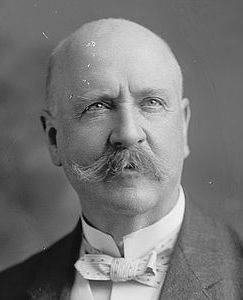 “That a joint resolution for the annexation of foreign territory was necessarily and essentially the subject matter of a treaty, and that it could not be accomplished legally and constitutionally by a statute or joint resolution. If Hawaii was to be annexed, it ought certainly to be annexed by a constitutional method; and if by a constitutional method it can not be annexed, no Senator ought to desire its annexation sufficiently to induce him to give his support to an unconstitutional measure.” Senator Bacon further explained, “Now, a statute is this: A Statute is a rule of conduct laid down by the legislative department, which has its effect upon all of those within the jurisdiction. In other words, a statute passed by the Congress of the United States is obligatory upon every person who is a citizen of the United States or a resident therein. A statute can not go outside the jurisdiction of the United States and be binding upon the subjects of another power. It takes the consent of the subjects of the other power, speaking or giving their consent through their duly authorized government, to be bound by a certain thing which is enacted in this country; and therein comes the necessity for a treaty.”
“That a joint resolution for the annexation of foreign territory was necessarily and essentially the subject matter of a treaty, and that it could not be accomplished legally and constitutionally by a statute or joint resolution. If Hawaii was to be annexed, it ought certainly to be annexed by a constitutional method; and if by a constitutional method it can not be annexed, no Senator ought to desire its annexation sufficiently to induce him to give his support to an unconstitutional measure.” Senator Bacon further explained, “Now, a statute is this: A Statute is a rule of conduct laid down by the legislative department, which has its effect upon all of those within the jurisdiction. In other words, a statute passed by the Congress of the United States is obligatory upon every person who is a citizen of the United States or a resident therein. A statute can not go outside the jurisdiction of the United States and be binding upon the subjects of another power. It takes the consent of the subjects of the other power, speaking or giving their consent through their duly authorized government, to be bound by a certain thing which is enacted in this country; and therein comes the necessity for a treaty.”
Nearly 100 years later, the United States Attorney General’s Office of Legal Counsel was befuddled by Congress’s annexation of the Hawaiian Islands by a joint resolution. In a 1988 memorandum titled “Legal Issues Raised by Proposed Presidential Proclamation To Extend the Territorial Sea,” the Office of Legal Counsel addressed the annexation of the Hawaiian Islands by joint resolution. Douglas Kmiec, Acting Assistant Attorney General, authored the memorandum for Abraham D. Sofaer, legal advisor to the U.S. State Department. After covering the limitation of Congressional authority and the objections made by members of the Congress, Kmiec concluded,
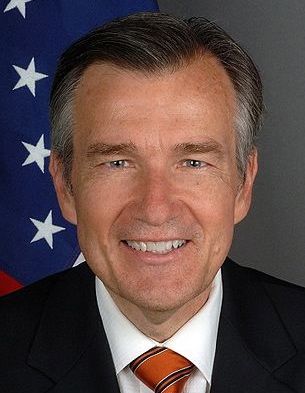 “Notwithstanding these constitutional objections, Congress approved the joint resolution and President McKinley signed the measure in 1898. Nevertheless, whether this action demonstrates the constitutional power of Congress to acquire territory is certainly questionable. … It is therefore unclear which constitutional power Congress exercised when it acquired Hawaii by joint resolution. Accordingly, it is doubtful that the acquisition of Hawaii can serve as an appropriate precedent for a congressional assertion of sovereignty over an extended territorial sea.”
“Notwithstanding these constitutional objections, Congress approved the joint resolution and President McKinley signed the measure in 1898. Nevertheless, whether this action demonstrates the constitutional power of Congress to acquire territory is certainly questionable. … It is therefore unclear which constitutional power Congress exercised when it acquired Hawaii by joint resolution. Accordingly, it is doubtful that the acquisition of Hawaii can serve as an appropriate precedent for a congressional assertion of sovereignty over an extended territorial sea.”
The United States very own Attorney General’s office in 1988 clearly undermines the claim of sovereignty over the Hawaiian Islands by the United States. If the Attorney General’s Office of Legal Counsel is “unclear” as to the authority of Congress to annex the Hawaiian Islands, it surely cannot be considered as a “valid demonstration of legal title” by the United States to be the successor of the Hawaiian Kingdom under international law. If the United States is not the successor, then the presumption of the Hawaiian Kingdom’s existence as an independent State is maintained. In other words, the Hawaiian Kingdom’s continued existence is protected by international law even when it has been under an illegal and prolonged occupation by the United States since the Spanish-American War in 1898.
State Attributes of the Hawaiian Kingdom
The Hawaiian Kingdom received the recognition of its independence and sovereignty by joint proclamation from the United Kingdom and France on November 28, 1843, and by the United States of America on July 6, 1844.
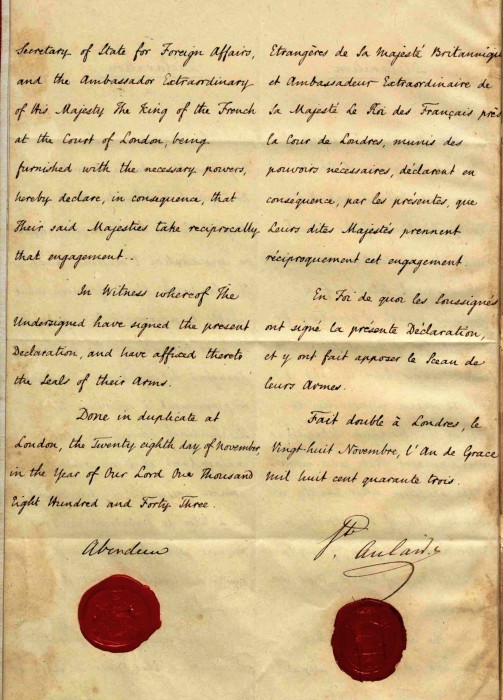 At the time of the recognition of Hawaiian independence, the Hawaiian Kingdom’s government was a constitutional monarchy that developed a complete system of laws, both civil and criminal, and have treaty relations of a most favored nation status with the major powers of the world, including the United States of America.
At the time of the recognition of Hawaiian independence, the Hawaiian Kingdom’s government was a constitutional monarchy that developed a complete system of laws, both civil and criminal, and have treaty relations of a most favored nation status with the major powers of the world, including the United States of America.
A. Permanent Population
According to Professor Crawford, The Creation of States in International Law, 2nd ed. (2006), p. 52, “If States are territorial entities, they are also aggregates of individuals. A permanent population is thus necessary for statehood, though, as in the case of territory, no minimum limit is apparently prescribed.” Professor Giorgetti, A Principled Approach to State Failure (2010), p. 55, explains “Once recognized, States continue to exist and be part of the international community even if their population changes. As such, changes in one of the fundamental requirements of statehood do not alter the identity of the State once recognized.”
 In his report to U.S. Secretary of State Walter Gresham, Special Commissioner James Blount reported on June 1, 1893, “The population of the Hawaiian Islands can but be studied by one unfamiliar with the native tongue from its several census reports. A census is taken every six years. The last report is for the year 1890. From this it appears that the whole population numbers 89,990. This number includes natives, or, to use another designation, Kanakas, half-castes (persons containing an admixture of other than native blood in any proportion with it), Hawaiian-born foreigners of all races or nationalities other than natives, Americans, British, Germans, French, Portuguese, Norwegians, Chinese, Polynesians, and other nationalities. Americans numbered 1,928; natives and half-castes, 40,612; Chinese, 15,301; Japanese, 12,360; Portuguese, 8,602; British, 1,344; Germans, 1,034; French, 70; Norwegians, 227; Polynesians, 588; and other foreigners 419. It is well at this point to say that of the 7,495 Hawaiian-born foreigners 4,117 are Portuguese, 1,701 Chinese and Japanese, 1,617 other white foreigners, and 60 of other nationalities.”
In his report to U.S. Secretary of State Walter Gresham, Special Commissioner James Blount reported on June 1, 1893, “The population of the Hawaiian Islands can but be studied by one unfamiliar with the native tongue from its several census reports. A census is taken every six years. The last report is for the year 1890. From this it appears that the whole population numbers 89,990. This number includes natives, or, to use another designation, Kanakas, half-castes (persons containing an admixture of other than native blood in any proportion with it), Hawaiian-born foreigners of all races or nationalities other than natives, Americans, British, Germans, French, Portuguese, Norwegians, Chinese, Polynesians, and other nationalities. Americans numbered 1,928; natives and half-castes, 40,612; Chinese, 15,301; Japanese, 12,360; Portuguese, 8,602; British, 1,344; Germans, 1,034; French, 70; Norwegians, 227; Polynesians, 588; and other foreigners 419. It is well at this point to say that of the 7,495 Hawaiian-born foreigners 4,117 are Portuguese, 1,701 Chinese and Japanese, 1,617 other white foreigners, and 60 of other nationalities.”
The permanent population has exceedingly increased since the 1890 census and according to the last census in 2011 by the United States that number was at 1,374,810. International law, however, protects the status quo of the national population of an occupied State during occupation. According to Professor von Glahn, The Occupation of Enemy Territory: A Commentary on the Law and Practice of Belligerent Occupation (1957), p. 60, “the nationality of the inhabitants of occupied areas does not ordinarily change through the mere fact that temporary rule of a foreign government has been instituted, inasmuch as military occupation does not confer de jure sovereignty upon an occupant. Thus under the laws of most countries, children born in territory under enemy occupation possess the nationality of their parents, that is, that of the legitimate sovereign of the occupied area.” Any individual today who is a direct descendent of a person who lawfully acquired Hawaiian citizenship prior to the U.S. occupation that began at noon on August 12, 1898, is a Hawaiian subject. Hawaiian law recognizes all others who possess the nationality of their parents as part of the alien population.
B. Defined Territory
According to Judge Huber, in the Island of Palmas arbitration case, “Territorial sovereignty…involves the exclusive right to display the activities of a State.” Crawford, p. 56, also states, “Territorial sovereignty is not ownership of but governing power with respect to territory.”
§6 of the Compiled Laws of the Hawaiian Kingdom states, “The laws are obligatory upon all persons, whether subjects of this kingdom, or citizens or subjects of any foreign State, while within the limits of this kingdom, except so far as exception is made by the laws of nations in respect to Ambassadors or others. The property of all such persons, while such property is within the territorial jurisdiction of this kingdom, is also subject to the laws.”
The Islands constituting the defined territory of the Hawaiian Kingdom on January 17, 1893, together with its territorial seas whereby the channels between adjacent Islands are contiguous, its exclusive economic zone of two hundred miles, and its air space, include:
Island: Location: Square Miles/Acreage:
Hawai‘i 19º 30′ N 155º 30′ W 4,028.2 / 2,578,048
Maui 20º 45′ N 156º 20′ W 727.3 / 465,472
O‘ahu 21º 30′ N 158º 00′ W 597.1 / 382,144
Kaua‘i 22º 03′ N 159º 30′ W 552.3 / 353,472
Molokai 21º 08′ N 157º 00′ W 260.0 / 166,400
Lana‘i 20º 50′ N 156º 55′ W 140.6 / 89,984
Ni‘ihau 21º 55′ N 160º 10′ W 69.5 / 44,480
Kaho‘olawe 20º 33′ N 156º 35′ W 44.6 / 28,544
Nihoa 23º 06′ N 161º 58′ W 0.3 / 192
Molokini 20º 38′ N 156º 30′ W 0.04 / 25.6
Lehua 22º 01′ N 160º 06′ W 0.4 / 256
Ka‘ula 21º 40′ N 160º 32′ W 0.2 / 128
Laysan 25º 50′ N 171º 50′ W 1.6 / 1,024
Lisiansky 26º 02′ N 174º 00′ W 0.6 / 384
Palmyra 05º 52′ N 162º 05′ W 4.6 / 2,944
Ocean 28º 25′ N 178º 25′ W 0.4 / 256
TOTAL: 6,427.74 (square miles) / 4,113,753.6 (acres)
C. Government
According to Crawford, p. 56, “Governmental authority is the basis for normal inter-State relations; what is an act of a State is defined primarily by reference to its organs of government, legislative, executive or judicial.” Since 1864, the Hawaiian Kingdom fully adopted the separation of powers doctrine in its constitution, being the cornerstone of constitutional governance.
Article 20, Hawaiian Constitution. The Supreme Power of the Kingdom in its exercise, is divided into the Executive, Legislative, and Judicial; these shall always be preserved distinct, and no Judge of a Court of Record shall ever be a member of the Legislative Assembly.
Article 31, Hawaiian Constitution. To the King belongs the executive power.
Article 45, Hawaiian Constitution. The Legislative power of the Three Estates of this Kingdom is vested in the King, and the Legislative Assembly; which Assembly shall consist of the Nobles appointed by the King, and of the Representatives of the People, sitting together.
Article 66, Hawaiian Constitution. The Judicial Power shall be divided among the Supreme Court and the several Inferior Courts of the Kingdom, in such manner as the Legislature may, from time to time, prescribe, and the tenure of office in the Inferior Courts of the Kingdom shall be such as may be defined by the law creating them.
1. Power to Declare and Wage War & to Conclude Peace
The power to declare war and to conclude peace is constitutionally vested in the office of the Monarch pursuant to Article 26, Hawaiian Constitution, “The King is the Commander-in-Chief of the Army and Navy, and for all other Military Forces of the Kingdom, by sea and land; and has full power by himself, or by any officer or officers he may judge best for the defense and safety of the Kingdom. But he shall never proclaim war without the consent of the Legislative Assembly.”
2. To Maintain Diplomatic Ties with Other Sovereigns
Maintaining diplomatic ties with other States is vested in the office of the Monarch pursuant to Article 30, Hawaiian Constitution, “It is the King’s Prerogative to receive and acknowledge Public Ministers…” The officer responsible for maintaining diplomatic ties with other States is the Minister of Foreign Affairs whose duty is “to conduct the correspondence of [the Hawaiian] Government, with the diplomatic and consular agents of all foreign nations, accredited to this Government, and with the public ministers, consuls, and other agents of the Hawaiian Islands, in foreign countries, in conformity with the law of nations, and as the King shall from time to time, order and instruct.” §437, Compiled Laws of the Hawaiian Kingdom. The Minister of Foreign Affairs shall also “have the custody of all public treaties concluded and ratified by the Government; and it shall be his duty to promulgate the same by publication in the government newspaper. When so promulgated, all officers of this government shall be presumed to have knowledge of the same.” §441, Compiled Laws of the Hawaiian Kingdom.
3. To Acquire Territory by Discovery or Occupation
Between 1822 and 1886, the Hawaiian Kingdom exercised the power of discovery and occupation that added five additional islands to the Hawaiian Domain. By direction of Ka‘ahumanu in 1822, Captain William Sumner took possession of the Island of Nihoa. On May 1, 1857; Laysan Island was taken possession by Captain John Paty for the Hawaiian Kingdom; on May 10, 1857 Captain Paty also took possession of Lysiansky Island; Palmyra Island was taken possession of by Captain Zenas Bent on April 15, 1862; and Ocean Island was acquired September 20, 1886, by proclamation of Colonel J.H. Boyd.
4. To Make International Agreements and Treaties and Maintain Diplomatic Relations with other States
Article 29, Hawaiian Constitution, provides, “The King has the power to make Treaties. Treaties involving changes in the Tariff or in any law of the Kingdom shall be referred for approval to the Legislative Assembly.” As a result of the United States of America’s recognition of Hawaiian independence, the Hawaiian Kingdom entered into a Treaty of Friendship, Commerce and Navigation, Dec. 20, 1849; Treaty of Commercial Reciprocity, Jan. 13, 1875; Postal Convention Concerning Money Orders, Sep. 11, 1883; and a Supplementary Convention to the 1875 Treaty of Commercial Reciprocity, Dec. 6, 1884.
The Hawaiian Kingdom also entered into treaties with Austria-Hungary (now separate States), June 18, 1875; Belgium, October 4, 1862; Denmark, October 19, 1846; France, September 8, 1858; Germany, March 25, 1879; the United Kingdom of Great Britain and Northern Ireland, March 26, 1846; Italy, July 22, 1863; Japan, August 19, 1871, January 28, 1886; Netherlands, October 16, 1862; Portugal, May 5, 1882; Russia, June 19, 1869; Spain, October 9, 1863; Sweden-Norway (now separate States), April 5, 1855; and Switzerland, July 20, 1864.
Foreign Legations accredited to the Court of the Hawaiian Kingdom in the city of Honolulu included the United States of America, Portugal, Great Britain, France and Japan.
Foreign Consulates in the Hawaiian Kingdom included the United States of America, Italy, Chile, Germany, Sweden-Norway, Denmark, Peru, Belgium, Netherlands, Spain, Austria-Hungary, Russia, Great Britain, Mexico and China.
Hawaiian Legations accredited to foreign States included the United States of America in the city of Washington, D.C.; Great Britain in the city of London; France in the city of Paris, Russia in the city of Saint Petersburg; Peru in the city of Lima; and Chile in the city of Valparaiso.
Hawaiian Consulates in foreign States included the United States of America in the cities of New York, San Francisco, Philadelphia, San Diego, Boston, Portland, Port Townsend and Seattle; Mexico in Mexico city and the city of Manzanillo; Guatemala; Peru in the city of Callao; Chile in the city of Valparaiso; Uruguay in the city of Monte Video; Philippines (former Spanish territory) in the city of Iloilo and Manila; Great Britain in the cities of London, Bristol, Hull, Newcastle on Tyne, Falmouth, Dover, Cardiff and Swansea, Edinburgh and Leith, Glasgow, Dundee, Queenstown, and Belfast; Ireland, in the cities of Liverpool, and Dublin; Canada (former British territory) in the cities of Toronto, Montreal, Bellville, Kingston Rimouski, St. John’s, Varmouth, Victoria, and Vancouver; Australia in the cities of Sydney, Melbourne, Brisbane, Hobart, and Launceston; New Zealand (former British territory) in the cities of Auckland and Dunedin; China in the cities of Hong Kong and Shanghai; France in the cities of Paris, Marseilles, Bordeaux, Dijon, Libourne and Papeete; Germany in the cities of Bremen, Hamburg, Frankfort, Dresden and Karlsruhe; Austria in the city of Vienna; Spain in the cities of Barcelona, Cadiz, Valencia Malaga, Cartegena, Las Palmas, Santa Cruz and Arrecife de Lanzarote; Portugal in the cities of Lisbon, Oporto Madeira, and St. Michaels; Cape Verde (former Portuguese territory) in the city of St. Vincent; Italy in the cities of Rome, Genoa, and Palermo; Netherland in the cities of Amsterdam and Dordrecht; Belgium in the cities of Antwerp, Ghent, Liege and Bruges; Sweden in the cities of Stockholm, Lyskil, and Gothemburg; Norway in the city of Oslo (formerly known as Kristiania); Denmark in the city of Copenhagen; and Japan in the city of Tokyo.
Acting Government On Course to Secure a Protecting Power
Since meeting with officials from the International Committee of the Red Cross (ICRC) on December 17, 2013 at its headquarters in Geneva, Switzerland, the acting government has been actively involved in securing a Protecting Power under the provisions of the Fourth Geneva Convention and the Additional Protocol 1. This process includes the ICRC and an unnamed State party to both the Fourth Geneva Convention and the Additional Protocol, but due to the sensitivity of the situation and negotiations the acting government is unable to provide a status report until a Protecting Power has been secured. A Protecting Power protects the interest of a third State and its citizenry during occupation.
The acting government deposited its instrument of accession to the Fourth Geneva Convention with the Swiss government on January 14, 2013 followed by its accession to the Additional Protocol 1 on December 16, 2013. As a party to the Geneva Convention, it is the duty of the acting government to secure a Protecting Power, being another party to the Geneva Conventions that is independent and not a party to the conflict. Article 5(1) of the Additional Protocol 1 provides: “It is the duty of the Parties to a conflict from the beginning of that conflict to secure the supervision and implementation of the Conventions and of this Protocol by the application of the system of Protecting Powers, including ‘inter alia’ the designation and acceptance of those Powers… Protecting Powers shall have the duty of safeguarding the interests of the Parties to the conflict.”
Article 1 of both the Fourth Geneva Convention and the Additional Protocol 1 provides that the “High Contracting Parties undertake to respect and to ensure respect for [the Convention and Protocol] in all circumstances.” According to the ICRC’s commentaries “the duty to respect implies that of ensuring respect by civilian and military authorities, the members of the armed forces, and in general, by the population as a whole.” The acting government has diligently worked to ensure compliance by these parties, but these authorities have recklessly disregarded the heeded warnings of compliance and have instead committed war crimes on a grand scale siding with the United States presence. This is directly attributable to the United States’ willful failure, as the occupying Power, to comply with the laws of occupation since the occupation began in 1898.
On this note, the ICRC comments, “In the event of a Power failing to fulfill its obligations, each of the other Contracting Parties, (neutral, allied or enemy) should endeavor to bring it back to an attitude of respect for the Convention. The proper working of the system of protection provided by the Convention demands in fact that the States which are parties to it should not be content merely to apply its provisions themselves, but should do everything in their power to ensure that it is respected universally.”
As stated on the acting government’s website:
“The primary objective of the Hawaiian Kingdom Government is to expose the occupation of our nation within the framework of the 1907 Hague Conventions IV and V and our domestic statutes, and to provide a foundation for transition and the ultimate end of the occupation of the Hawaiian Kingdom. Article 43 of the 1907 Hague Convention IV mandates that the occupying government, being the United States of America, must administer the laws of the occupied State, being the Hawaiian Kingdom, and any deviation of this mandate is a violation of international law.”
Hawai‘i War Crimes: Destroying or seizing the Occupied State’s property
War crimes are actions taken by individuals, whether military or civilian, that violates international humanitarian law, which includes the 1907 Hague Conventions, 1949 Geneva Conventions and the Additional Protocols to the Geneva Conventions. War crimes include “grave breaches” of the 1949 Fourth Geneva Convention, which also applies to territory that is occupied even if the occupation takes place without resistance. Protected persons under International Humanitarian Law are all nationals who reside within an occupied State, except for the nationals of the Occupying Power. The International Criminal Court and States prosecute individuals for war crimes.
War Crimes: Destroying or seizing the [Occupied State’s] property unless such destruction or seizure be imperatively demanded by the necessities of war
On August 12, 1898, the United States of America seized approximately 1.8 million acres of land that belonged to the government of the Hawaiian Kingdom and to the office of the Monarch. These lands were called Government lands and Crown lands, respectively, whereby the former being public lands and the latter private lands. These combined lands constituted nearly half of the entire territory of the Hawaiian Kingdom.
Beginning on July 20, 1899, President McKinley began to set aside portions of these lands by executive orders for “installation of shore batteries and the construction of forts and barracks.” Below are the schematics for defense of the popularly known Diamond Head crater at Waikiki.
The first executive order set aside 15,000 acres for two Army military posts on the Island of O‘ahu called Schofield Barracks and Fort Shafter. According to Van Brackle’s “Pearl 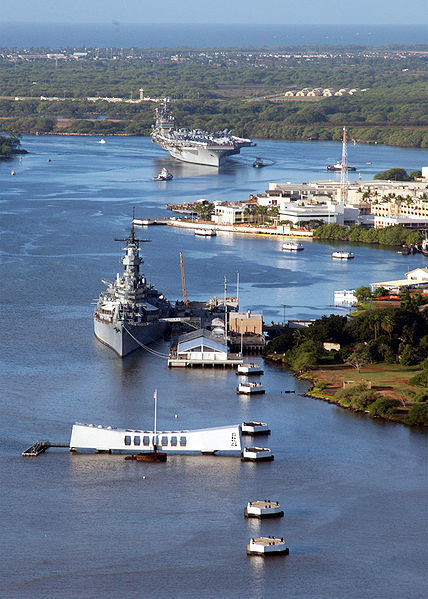 Harbor from the First Mention of ‘Pearl Lochs’ to Its Present Day Usage,” this soon followed the securing of lands for Pearl Harbor naval base in 1901 when the U.S. Congress appropriated funds for condemnation of 719 acres of private lands surrounding Pearl River, which later came to be known as Pearl Harbor. By 2012, the U.S. military has 118 military sites that span 230,929 acres of the Hawaiian Islands, which is 20% of the total acreage of Hawaiian territory.
Harbor from the First Mention of ‘Pearl Lochs’ to Its Present Day Usage,” this soon followed the securing of lands for Pearl Harbor naval base in 1901 when the U.S. Congress appropriated funds for condemnation of 719 acres of private lands surrounding Pearl River, which later came to be known as Pearl Harbor. By 2012, the U.S. military has 118 military sites that span 230,929 acres of the Hawaiian Islands, which is 20% of the total acreage of Hawaiian territory.
Military training locations include Pacific Missile Range Facility, Barking Sands Tactical Underwater Range, and Barking Sands Underwater Range Expansion on the Island of Kaua‘i; the entire Islands of Ni‘ihau and Ka‘ula; Pearl Harbor, Lima Landing, Pu‘uloa Underwater Range—Pearl Harbor, Barbers Point Underwater Range, Coast Guard AS Barbers Point/Kalaeloa Airport, Marine Corps Base Hawai‘i, Marine Corps Training Area Bellows, Hickam Air Force Base, Kahuku Training Area, Makua Military Reservation, Dillingham Military Reservation, Wheeler Army Airfield, and Schofield Barracks on the Island of O‘ahu; and Bradshaw Army Airfield and Pohakuloa Training Area on the Island of Hawai‘i.
The United States Navy’s Pacific Fleet headquartered at Pearl Harbor hosts the Rim of the Pacific Exercise (RIMPAC) every other even numbered year, which is the largest international maritime warfare exercise. RIMPAC is a multinational, sea control and power projection exercise that collectively consists of activity by the U.S. Army, Air Force, Marine Corps, and Naval forces, as well as military forces from other foreign States. During the month long exercise, RIMPAC training events and live fire exercises occur in open-ocean and at the military training locations throughout the Hawaiian Islands. In 2012, Australia, Canada, Chile, Colombia, France, India, Indonesia, Japan, Mexico, Malaysia, Netherlands, New Zealand, Norway, Peru, Philippines, Russia, Singapore and South Korea participated in the RIMPAC exercises.
In 2006, the United States Army disclosed to the public that depleted uranium (DU) was found on the firing ranges at Schofield Barracks on the Island of O‘ahu. It subsequently confirmed DU was also found at Pohakuloa Training Area on the Island of Hawai‘i and suspect that DU is also at Makua Military Reservation on the Island of O‘ahu. The ranges have yet to be cleared of DU and the ranges are still used for live fire. This brings the inhabitants who live down wind from these ranges into harms way because when the DU ignites or explodes from the live fire, it creates tiny particles of aerosolized DU oxide that can travel by wind. And if the DU gets into the drinking water or oceans it would have a devastating effect across the islands.
The Hawaiian Kingdom has never consented to the establishment of military installations throughout its territory and these installations and war-gaming exercises stand in direct violation of Articles 1, 2, 3 and 4, 1907 Hague Convention, V, Respecting the Rights and Duties of Neutral Powers and Persons in Case of War on Land.
The deliberate and willful decision by the United States of America’s administration, as the occupant State, not to comply with international law and establish a military government since 1893 to administer the laws of the Hawaiian Kingdom, being the occupied State, has led to grave breaches and war crimes on an grand scale equal to none in the history of the world and the ramifications are world wide.
As a consequence of the illegal presence of United States military installations throughout the Hawaiian Islands, the United States of America consequently placed the Hawaiian Kingdom and its population in perilous danger from military attack by foreign States. On December 7, 1941, Japan’s military attacked United States military sites on the Island of O‘ahu.
In 1990, the United States Federal Emergency Management Agency (FEMA) published Risks and Hazards: A State by State Guide. One of the subjects included nuclear targets and identified six (6) nuclear targets on the island of O‘ahu that coincided with the locations of military posts of the U.S. Army, Navy, Air Force and Marines. Also included as a target is the Headquarters of the U.S. Pacific Command at Camp Smith that lies in the back of a residential area called Halawa. According to FEMA, the entire Island of O‘ahu would be obliterated if a nuclear attack were to take place.
The United States military presence also incurs the threat of attack from States and non-State actors who are adversaries of the United States of America. On March 26, 2013, the New York Times reported, “North Korea said on Tuesday that all of its strategic rocket and long-range artillery units ‘are assigned to strike bases of the U.S. imperialist aggressor troops in the U.S. mainland and on Hawaii and Guam and other operational zones in the Pacific as well as all the enemy targets in South Korea and its vicinity.’” The Christian Science Monitor also reported, “North Korea announced today in a blizzard of threats that it is ready to target US military bases in Guam and Hawaii as part of a full-alert military posture.”

